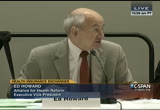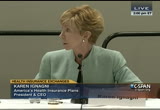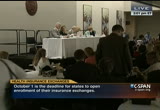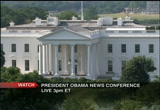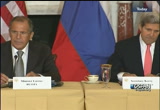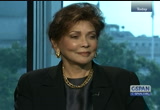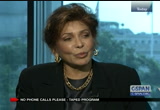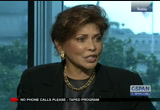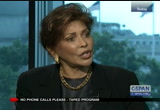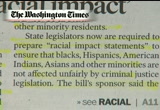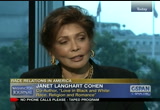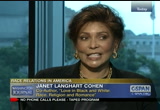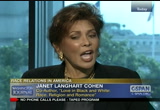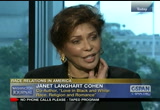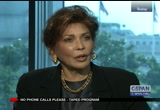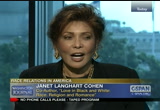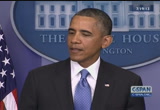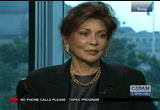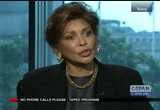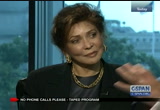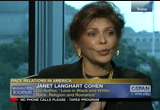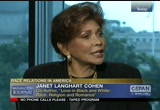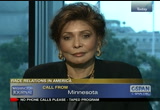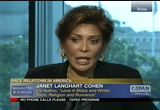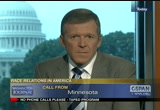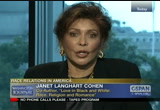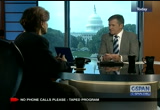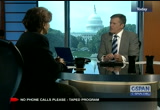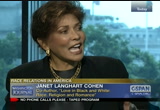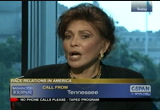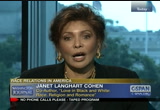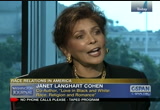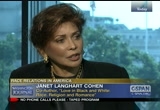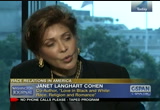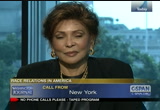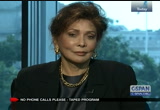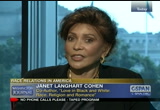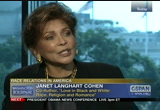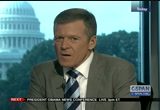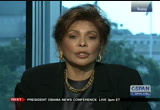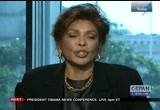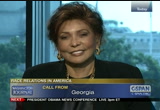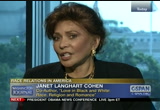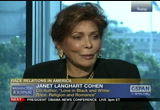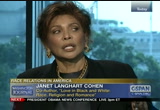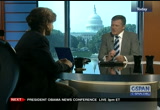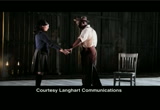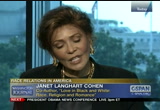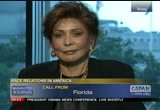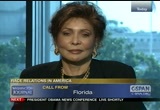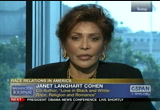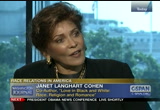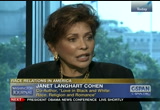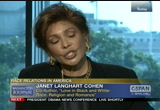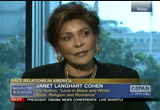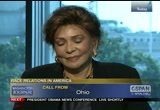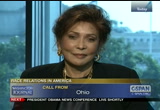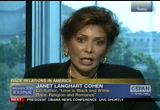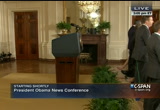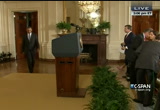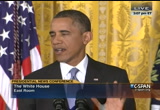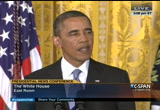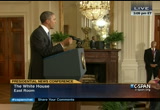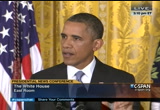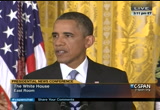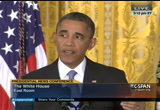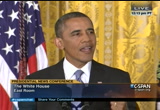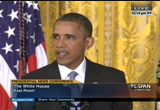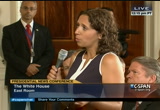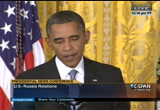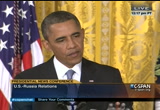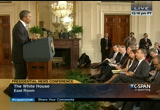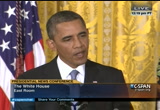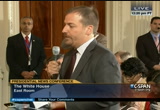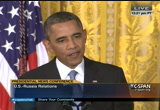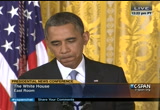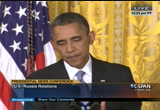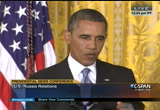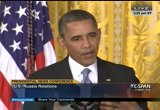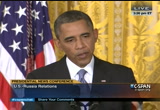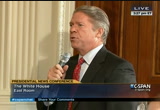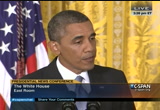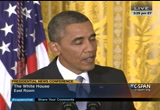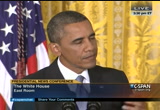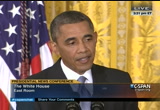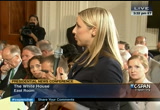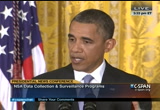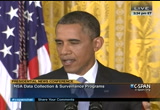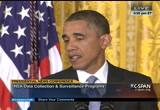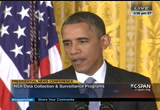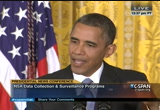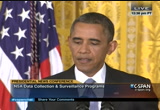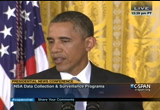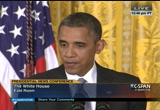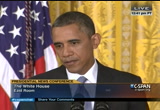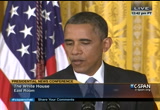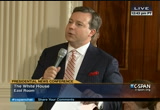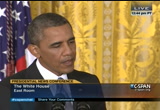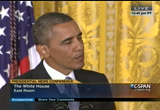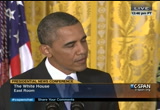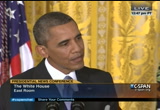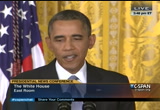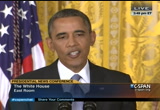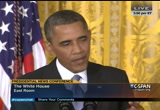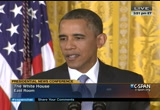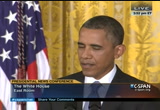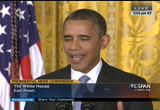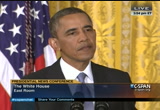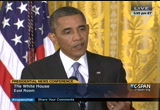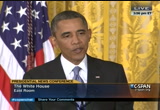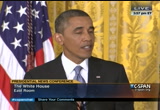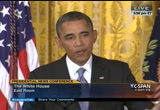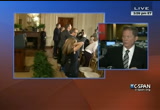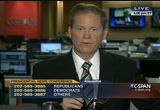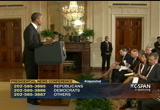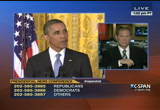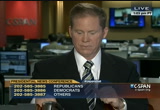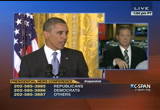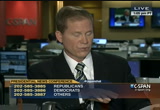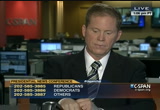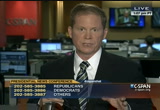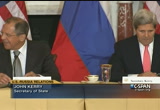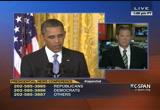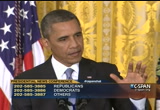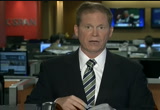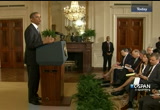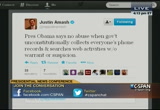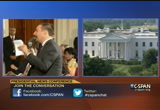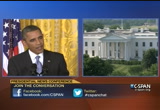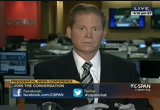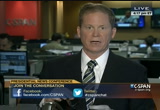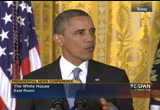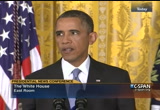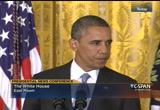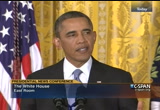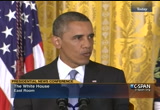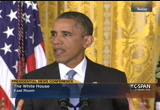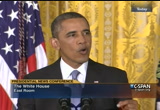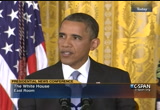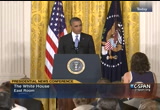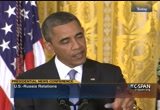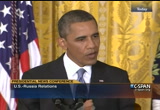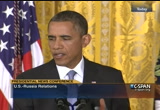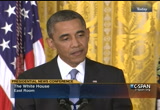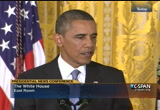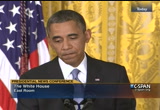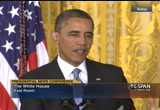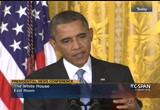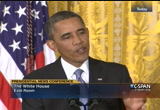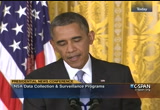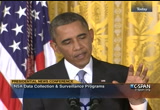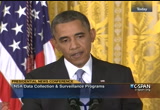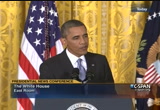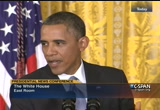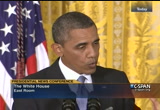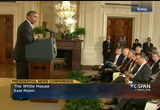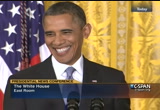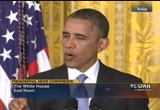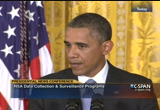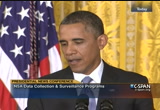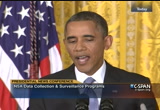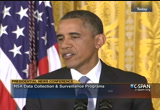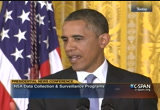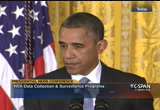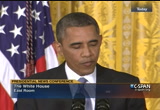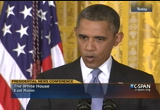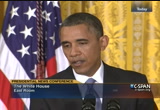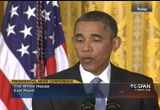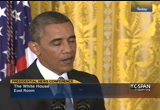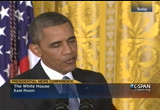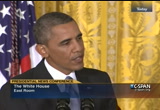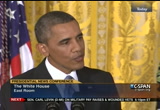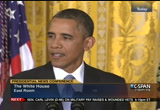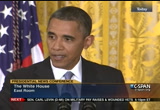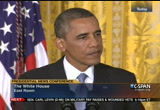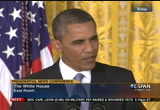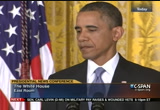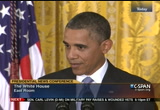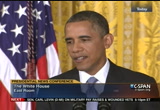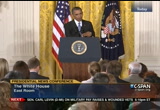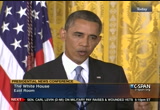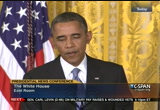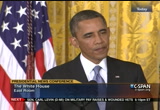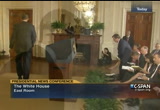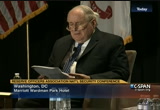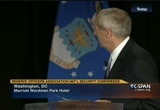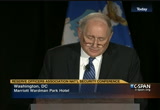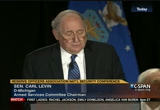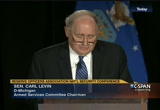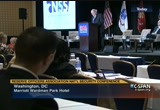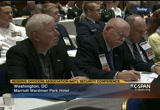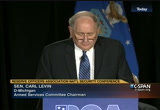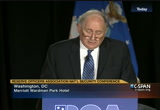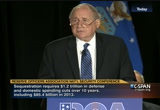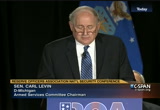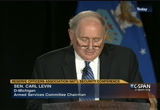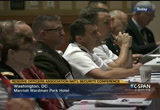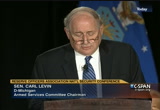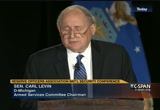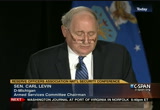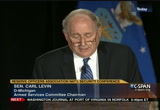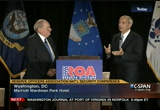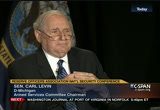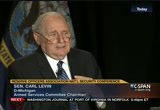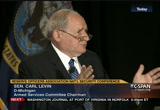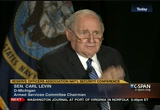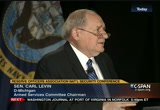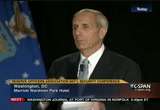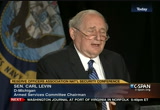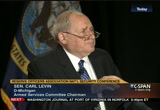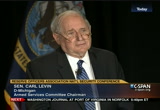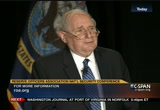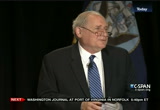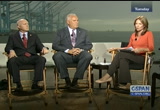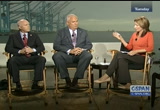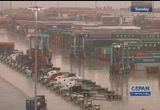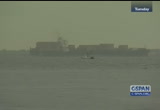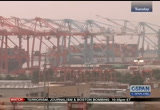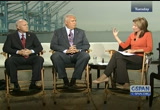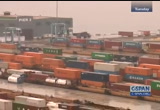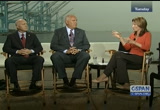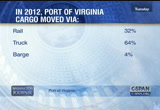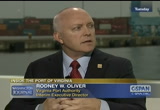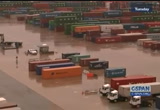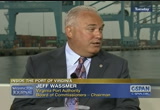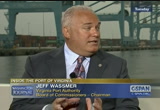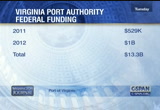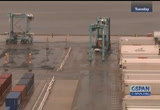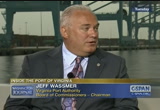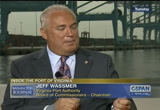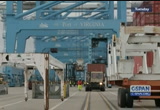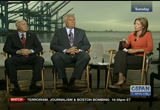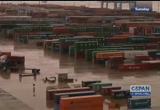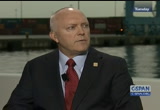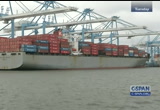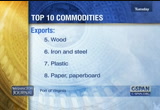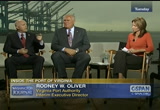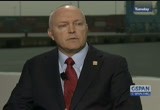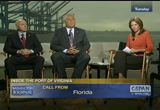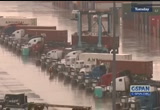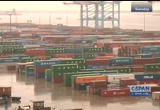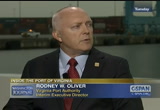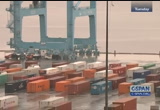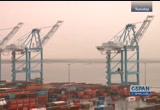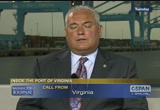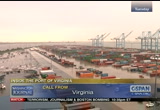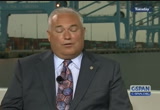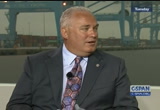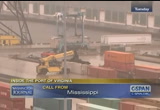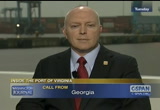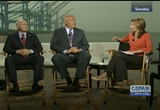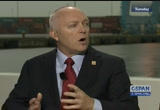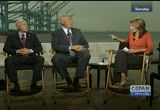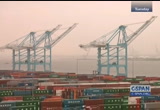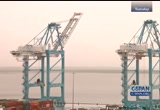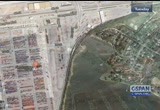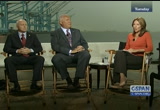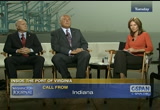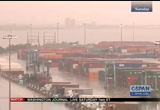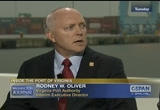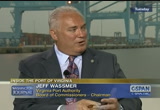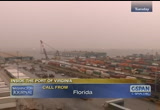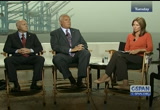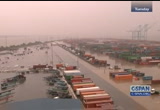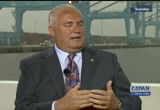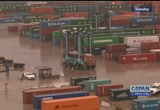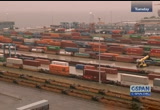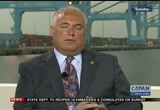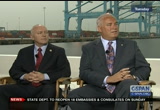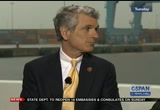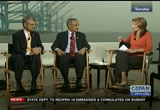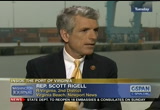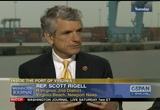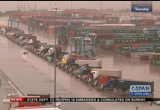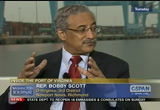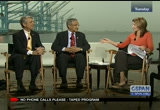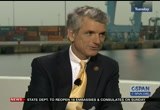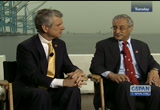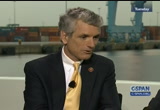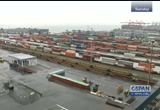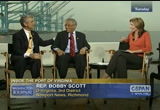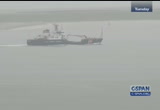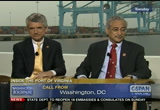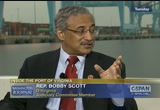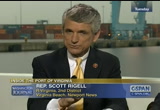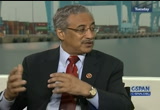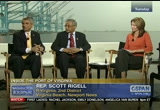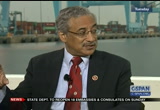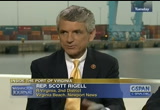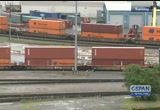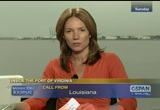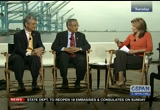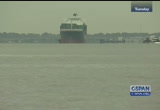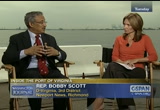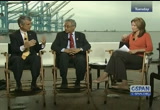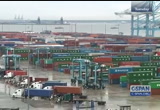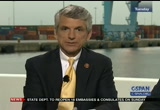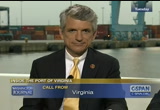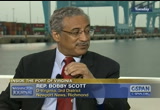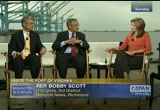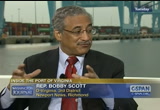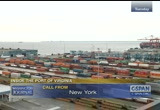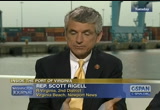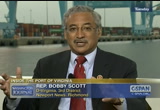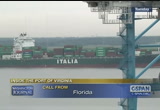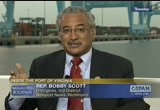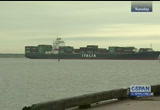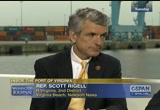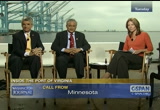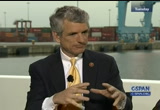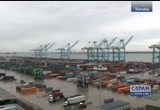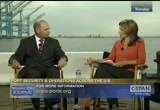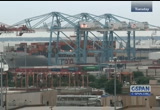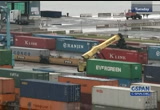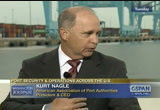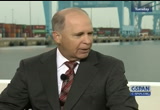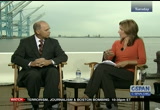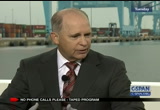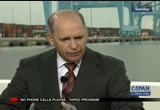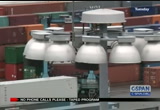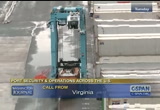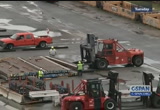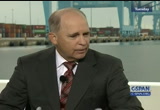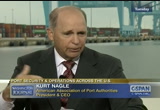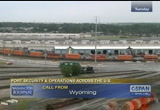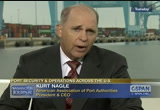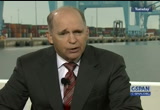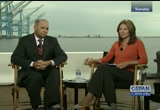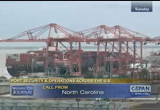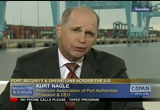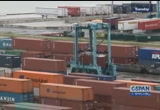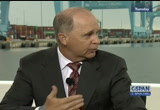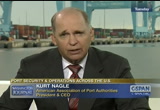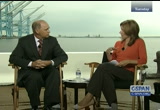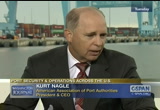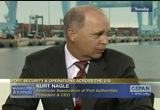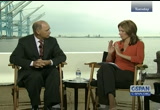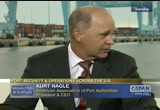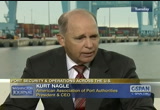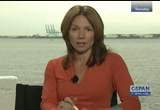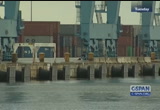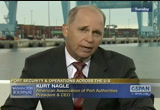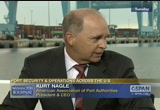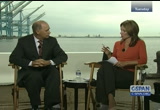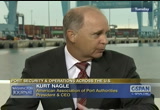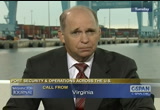tv Politics Public Policy Today CSPAN August 9, 2013 2:00pm-8:01pm EDT
2:00 pm
system as the navigators do? >> yes. >> well, agents and brokers for example, sort of the kitchen table test will be helping people determine whether or not they have a chance of getting a subsidary and so on and so do.h. how do you compare one plan to another? what kinds of diseases do having your family or my to have the possibility or? rob ability of having how do you look at networks and so on and so forth? so the scars of decisions are being talked about by agents and brokers with their clients. and normally at kitchen tables across the country. but certainly they will be helping people determine whether they are candidates for these subsidies. there's no question. >> i believe that is the last
2:01 pm
word. whoologize for those folks wrote good questions on cards but we didn't have time to get to. but i would ask one final time for you to fill out the blue evaluation forms if you haven't already. i would also like to thank eric colleagues -- to thank our helping to ar great extent shape this program and put it together with an excellent panel. and i would like you to help me think that panel for what i bet is not the last time we address this question. it is certainly one of the most and lighting discussions we had on exchanges. inc. you. -- thank you. [applause] [captioning performed by national captioning institute]
2:02 pm
[captions copyright national cable satellite corp. 2013] >> if you missed any of this exchange, you can find the video in our library at c-span.org. sending hisama is -- president obama is signing the student lending bill. the president this afternoon will be holding a news conference beginning at 3 p.m. eastern. a number of topics to be addressed come including u.s.- russia relations and also the white house or the associate reporting that the president is meeting with apple theat&t about concerns with
2:03 pm
government sweeping surveillance service. john kerry and chuck hagel have been meeting with their counterparts at the state department today. at the beginning of that meeting, secretary kerry noted that the relations between the two countries is important and what they shared, but they also have different interests. ears a little bit of what he had to say. here is aationship -- little bit of what he had to say. >> the relationship is needless to say a very important relationship. and it is marked by both shared interests and, at times, colliding and conflicting interests. i think we are all very clear about that. surrogate lover off and i are old hockey players -- sergey laborov and i are old hockey players. we are aware of the occasional collision. so we are candid about the areas in which we agree but also in the areas which we disagree.
2:04 pm
it is no secret that we have experienced some challenging justts and obviously not over the snowden case. >> all of those remarks are in our video library at c-span.org. president obama's news conference is coming up this afternoon at 3 p.m. eastern. we will ring that to you and follow it with your phone calls, your facebook comments and tweets. president'sp to the news conference coming conversation from this mornings washington journal on the president's remarks on the recent george zimmerman verdict and looking at race relations in the u.s.. in a recent op-ed in "the washington post," you wrote on multiple occasions, obama has asked lacks to understand the high wire he is forced to walk on the subject of race. he has treated that we cut him
2:05 pm
some slack. so, even asne conditions in the but community have become more desperate. guest: yes, i did that. i wrote that as an op-ed in "the washington post," as a he for the president to speak at truthfully and boldly on the issues of race and racism and white still matters in this country. after the zimmerman verdict, many of us were stunned and concerned about raising these old questions and people of color get justice in the criminal justice system here in america. and i wanted the president to speak to that. president spoken to that in your point of view? guest: he surprised everybody by walking into the briefing room two days later and he spoke in a way, here, that no other president before him could have spoken.
2:06 pm
from a personal experience, having experienced racism and racial profiling as a young man, all the way up to his becoming a u.s. senator. you have to bear in mind the president is a harvard graduate, magna cum laude, university professor and has written several books and he has been profiled in his life. so he knew something about racism and he spoke to at beautifully and i applaud the president for doing that. i think he opened the conversation on the issue of race and racism. ed, many ofe the op- my friends and some of the reporters that i most admired him they were opposed to the president speaking on this issue because he said the president would degrade the conversation. contraire, anyau precision the president enters, he elevates it. host: how would he degrade the conversation? guest: that's what i said.
2:07 pm
now you see oprah winfrey and others speaking out about it. and i would like to see more whites speak out about it. host: what was the about the zimmerman-trayvon martin case the angered you? yes: it angered me and it stunned me. i don't know quite really stunned me, peter, because as african-americans, we are so accustomed sadly, tonight getting justice in the system. but i was hoping against hope that this time would be different. and while the defense and the prosecutors were saying adamantly that this case is not about racial profiling or race, it's not about stand your ground, i thought it was exactly that. and it angered me and frightened me because, i thought, given our history in this country where young black males are concerned, this verdict, that law would send a signal to the rest of the society, the intolerant part of our society that it's open
2:08 pm
season on young black boys and men. host: it is talking but the state of oregon and how they now have racial impact statements when it comes to creating laws and verdicts. guest: what does that mean? post: the next time lawmakers in oregon want to increase the maximum sentence for arson, there aren't just requirements for child custody applications, they will have two explaining the potential impact on the state's hispanic, black and other minority residents. state legislators are now required to prepare racial impact statements to ensure that blacks, hispanics, american indians, asians and other minorities are not affected unfairly by criminal justice legislation. guest: that is a good move. it is said that in the 21st
2:09 pm
century we saw to consider that. but when you consider our history, particularly my history -- and yours -- 300 years of slavery and 100 and so years of america, segregated america, jim crow, lynching that we couldn't get federal sanctions against lynching? it's about time that we consider that. race is a factor in sadly every aspect of our society. host: you're the co-author of a book, "love in black-and-white ." yes, with my husband. he is the first republican to serve in a democratic administration. asserved bravely interagency secretary of defense. he was the republican senator
2:10 pm
for the great state of maine. he and i decided to ready but the kids in i note -- and i both know something. tell is half irish and half jewish. his mother was irish and his mother was jewish. because of jewish law, the jewishness is passed through the matrilineal line. not jewish, heas could not be accepted as jewish and not be part of ms. fudd -- and not be arm it's fun -- and vahed. bar mitz i felt, as an african american growing up in apartheid america, it wasn 1941 when segregated. my husband and i deck and could not sit together on a bus, much less marry each other. so i know something about being in a country that i love and loving the country more than it loves me and sometimes feeling
2:11 pm
like an outcast. so together, we wrote this look " ove in black-and-white, wha host: this is a poll that just came out. guess: how sad. we are supposed to be an integrated society. you have friends from another race, don't you, peter? post: sure. -- host: sure. guest: even though we have integration and we go to school together, it is probably pretty much like it was when i was at the university. the white children or students and i would study together and something would happen when we would leave class. we would go our separate ways. in the classroom, we had to learn math in a book, english and a book, but we didn't have to learn the social mores in a
2:12 pm
book. we all knew the rules and we would go our separate ways. and charles barkley was talking recently in one of his books about how, in alabama, the kids get along fine,. but they have a black homecoming queen and a white homecoming queen. i have friends of many races. i have cambodian friends and friends from bolivia and my husband, of course, is a friend from a different race, my best friend. host: who is your best what friend? -- who was your first friend of:? guest: i don't usually think of friends in terms of color but character. dearest friend i
2:13 pm
adopted as my godmother, one of the first woman to serve in world war ii. hutch is her name. we just lost her a few years back good she was my dear heartfelt friend. host: why until age 35 to do not have a white friend? guest: i grew up segregated. you get lucky when you get a friend and you can hold onto them. but i never really thought in terms of race and friendship. host: if you had the generalized race relations in the u.s. guest: i think we might get a c. we must celebrate our triumphs. we have an african-american president, like men in the white house, the one man in the white
2:14 pm
house doesn't get rid of all of the disparities in unemployment and video in education and the mass incarceration of black men. while i want to say that, the narrative is always negative and it's not good. but there are more like children, black students in college than there are black .eople in prison so i want to make sure i make that point. but it's like martin king said. we have a long way to go. we've come a long way. we're not in slavery and when we were in slavery we were told it would for for -- to wait for freedom. when we were free, we're told to to wait for quality and our rates. and when we got a black resident, we were told to -- black president, we were told to wait for his second term to say anything to him about race issues. from what i understand, the president will speak on the march on washington
2:15 pm
commemorating "i have a dream ." i think that will be his legacy speech. i think they will remember that speech the way they remember the gettysburg address from abraham lincoln. i think it will be something special. host: a few days after your op- of thee's a little bit president president talking about his own experience with race. >> and then finally come i think it will be important for all of us to do some soul-searching. there has been talk about whether we should convene a conversation on race. i haven't seen that be particularly productive when politicians try to organize conversations. they end up being stilted and are locked and folks
2:16 pm
into the positions they already have. on the other hand, families and workplaces, there is a possibility that people are a little bit more honest and at least you ask yourself your own bringing --out am i and my reading as much by a set of myself as i can? amide urging people as much as i can aced on not the color of their skin, but the content of their character? that would be inappropriate -- that would be an of rope bridge reaction to this -- that would be an appropriate reaction to this tragedy. caller: can you hear me? thank you foro prompting the president to speak
2:17 pm
out on his humanity. i know he is in a tie position and has to be careful about what he says. i think the president has to sometimes take the lead and try to bring people to come to some sort of conclusion that involves everyone am a that brings everyone together. that is his job, to bring people together. i know it is hard for him to about being a black person in a white society. and he supposedly represents everyone. but he does have to do this. he is the leader. and i think you for prodding him and trying to get him to look at it in this manner. you have a nice day. guest: thank you very much.
2:18 pm
if we have a woman president, will she forfeit any discussions on women's or productive rights or rate or equal pay or bricking the glass ceiling? if we have a jewish president, will they be prohibited from speaking on issues important to the jewish community? or someonea veteran who is disabled as we did with franklin delano roosevelt, with a b recruited from speaking on the issues -- would they be recruited from speaking on the issues. thank you for calling. i agree. he is the leader regardless of his race. when my husband served with bill clinton, the resident had just had an economic summit and st the president had an economic summit and my husband met with him in the rose garden. a note said, dear mr. president, now that you have had a summit on economics, will you please
2:19 pm
have a summit on race? we had a race reconciliation right here at c-span. you covered it here in i think it was in two thousand eight, before the president was elected. we talked about race. thead it from each side of color line. we asked whites to leave their shame at the door and for blacks to leave their blame and to come together and talk. we african americans talk about race all the time. based on what i'm, quite stop about race all the time. so why don't we talk about it together, engage in a friendly conversation and see if we can resolve this stain on our country? host: before this segment, we talked about dividing our normal lives which we divide politically. we talked about dividing them by race. host: i would have loved that.
2:20 pm
we rarely ever hear what people talk about race. inhusband is a great leader the conversation on race. he is one of the few fight men. ken burns, the great documentarian. david deren, peggy mcintosh, but we don't hear what people -- i want to sit back and hear what people talk about what they will do about it, how they feel about it, why they are afraid of black men, why do they find the masculinity of our men menacing? i would like to know about that. i would like please commissioners to talk about race. there is a disproportionate number of black men and boys accidentally murdered by police. the pope has just come out in his trip home from brazil and he talked about you shall not judge here in he will not judge those who a different orientation. for those who are gay.
2:21 pm
that was evolutionary, revolutionary for the pontiff to say what he said durin. so he can talk about this you. why can't eat -- so he can talk about this issue. why can't he talk about race in italy? he doesn't have to come all the way to the faithful here to talk about race. you can begin their in italy and sadly racism is a global problem. host: hopefully they will listen to you and do that. smiley tweets in. guest: as i just said, i did write a personal note to bill clinton, president clinton, because i knew him. i don't know president obama. i've only seen him socially. but i do know president clinton and my husband at hand in a note to ask them to talk about race and racism and he agreed to do it. and as i said, events overtook
2:22 pm
the situation and he was unable to do that. post: janet lang heart is our guest. caller: i find the hypocrisy of liberals and people that constantly want to point out the color of skin instead of content of character amazing. recently on the news, which is being ignored, there were three young like teenagers beating up a white boy in a bus. you don't hear jesse jackson or al sharpton. it doesn't fit their narrative so they don't speak about it to as far as president obama being reluctant to talk about race because it is divisive, don't you remember that stupid beer summit where he threw his grandmother under the bus?
2:23 pm
i'm not afraid of a black kid. , fred of a kid that wears his pants down around his sides, -- i'm afraid of a kid that wears his pants down around his sides, has a hoodie on and where statues and doesn't have a job. i don't care if they are white or black. that is what i'm afraid of. and everyone uses that type of discerning. host: can we ask you come and eu have black friends -- do you have black friends? caller: i have had black friends. but there you go again. we should leave this alone. planned parenthood destroys more black babies. the black community is devastated and the liberals have acted like black people can take care of themselves.
2:24 pm
welfare, affirmative action, it's so insulting. host: that is a lot of information. guest: i just want to say to patty that i'm really sorry about young white kid who was beaten. i think it is wrong for anybody to lior hurt anybody. if you haven't found -- if you haven't heard from jesse jackson or al sharpton, you have just heart:.om janet lang as far as president obama throwing his grandmother under hear himi did not saying that she was nervous about black men. a woman of prayer was culturally conditioned -- a woman of her era was culturally conditioned to fear our men. i think that the president spoke boldly and honestly. host: lauren.
2:25 pm
to dumppeter, you need this program and run for president here in i appreciate what you're saying. i have gotten into dialogue about race for years and years and years. and a find it frustrating when i hear people say we need to have a national dialogue or we need to talk about race. so here is my question. what specifically would you like to have whites discuss and what would be the outcome? quite?awrence, are you -- are you white? caller: no. i am black. i have been subject to physical racism and i have observed institutional racism. i know that it is out there. and i also say -- and i don't
2:26 pm
mean this lightly so don't take blacks way -- there is a in the white house house. we have come a long way in this country. not that there aren't issues out there. but companies have removed barriers that present -- that prevented men and women from moving forward. we have come a long way and i think what we really need to do is have a dialog that says what do we need to do to take care people who have had behavior, not throw down the victim mentality. guest: as far as the conversation i want white people to have, it is the same conversation we had, except have it in public did and i would like white people to recognize the history in this country. a lot of it is not studied in our history books. i learned more about the holocaust when our debts when i was in school than in slavery. i knew there was northern
2:27 pm
aggression and confederacy and abraham lincoln freed the slaves. i knew very little about the economics of slavery. and i think it is important to , theabout the advantage whitesd privilege that have. i'm sure, peter, when you walk into a video store and someone follows you, you probably think they are there to serve you. because of my conditioning as an african american or black person, as i, too, prefer to be called, i'm not sure they're coming to serve me or patrolling the are monitoring me. because i am highly visible, maybe the edges coming over to say hello, but i don't know that. but the cultural conditioning has made me first take about race and that is unfortunate. so i would like to know what do whites think of that. when we talk to our children about pulleys, we are very serious in giving our young men "the talk."
2:28 pm
it is about what you do when you are encountered by the police. -- what do white people tell their children about encountering the police? i want to know what white people say about their privilege, say if they see us as victims, why do the css seeing ourselves as victims and do they know american history from each point, from eastside -- from each side of the mason-dixon line? : do you remember when you discovered that you are black? guest: very early.
2:29 pm
i think children can learn very early and you have to be very carefully taught. i remember being in a department store with my mother and i was about five or six years old and i said what kind of kids are they and she at -- and she said they're just kids. i said, no, they look different. she said they are white. and i said what am i? and she said you are colored, because we were called colored at that time. i said who colored me? and i noticed that they were always over there and we were always over here. around seven, when inserted taking piano lessons, i had to go to downtown indianapolis and it was a very polite but segregated city. mother taught me that there are people in this world who won't like you sadly because of your color. and i asked her, i said who are they?, what are their names she said that is not important. they probably will be white. but i don't you want -- but i don't want you to measurers
2:30 pm
judge someone by something they can't tell. so there was a delicate balance and understanding that there was racial prejudice in the world and that there were good people in the world like my husband, like you, peter. many others that i can name and sincethink of more now you asked me who my white friends are. there are a lot of them. i just hadn't thought of them in terms of race. woman and i a white grew up in georgia. turnedatched georgia into -- the community that i lived in -- turn from a middle- class working hard community to a black community. up.violence shot robberies and carjackings and property values went down. but you asked what we teach our children your you use the victim
2:31 pm
card as a way to further your agenda. it is always you are a victim and everybody is out to get you and you teach your children that the whites are after you. we don't teach our children that the black man is out to get them and the black man is the reason for all of our ills. i know this is going to sound rude and i don't mean it to be rude, but you need to get over the slavery. it happened 200 years ago. we had nothing to do with slavery and i'm against slavery. guest: but you are the beneficiary of slavery and all of the preferential treatment of whites. why do you think black schools are closing and did you realize that when ron -- when brown versus board of education in 1954, many southern white schools closed their schools before they would integrate with black children.
2:32 pm
are you aware of that? host: the colors gone. is what about -- the caller gone. but what about her statement about her neighborhood going downhill? i am not a sociologist. but there is a circle of poverty that wraps itself around the black community and the lack of education. she probably doesn't know that come in this country, it was illegal for black children to learn to read and write. and if she were a white woman attempting to teach a black child to read and write, she could be fined. they were discouraged from reading and writing can and then when we tried to advance and then we can't read and write, we are called dumb. rather than trying to give a lesson in racial history in america 101, i would suggest that she just click onto american history on google, race history, atlanta and georgia
2:33 pm
history and learn more about it and then i think she can answer her own question. the voting rights act, affirmative-action? when: it is interesting you talk about the voting rights act. as is in the course. it is rolling back so many of the gains that men and women, black and white, in this country fought and died to get good the right -- to get. the right to vote could isn't that the most democratic right one should have? and they rolled it back. they had taken out the teeth, section five. host: part of the argument was because we have advanced so far. guest: a not that far. how do you have 300 years of slavery and 150 years of apartheid and segregation and denial of equal opportunity of black children to learn to read 30 write and then you have years of affirmative action and you say oh, we are all equal now?
2:34 pm
no. it takes a little longer than that. it is almost able to think that we have had enough and to roll it back -- it is all most evil to think that we have had enough and to roll it back. after the decision from the supreme court, they have all rushed to establish more obstacles to prevent easy voting for young people, old people, black people, people of color. they have reinstituted these obstacles. and to eric holder's credit, at the president's behest, he is doing something about it. he has taken that on and i hope he wins. it is every american's right to vote. and to make it harder -- they are closing down voting on registering,me-day you have to have voter id to vote. when i was growing up in
2:35 pm
apartheid america, dead white people could vote when living by people couldn't. this country has been good to me with all of its obstacles and i come from the bottom of the socioeconomic bottom and have risen to the top. only in america could someone like me arrived to where i am. but with all the goodness -- and i am not a victim -- i am victorious -- i have risen to the top. so has colin powell and oprah winfrey, connie rice, and i can go on and on and name those. this country has a love to be victorious. so if we, the people of color, coming out of wanted can rise and be successfully contribute to this country, then those who have no experience with prejudice and oppression should thanre generous and rather calling us names and saying we are victims and why don't we get
2:36 pm
over slavery, would you tell someone jewish to get over the holocaust? i did say she would not. host: troy from west babylon, new york. please be hillary clinton's running mate. we need you in the office. so much to talk about this mining. and i have aman white friend who makes rush limbaugh look like bill mark. you want to -- bill maher. race, youo talk about can do it by region or by age. there is so much stuff to tell you people. to hear people from the red states call up and have liberal values, there are a lot of changes from 1998 till now. as far as race goes, limitary something. i will be totally honest with
2:37 pm
you. i don't want to offend anybody. but there are a lot of good people in the world but there are a lot of people who can be black or white or whatever your. if you have something for -- they and some thing don't have anything in the want you to be just as miserable as they are. think of a black man who walked into a diner at four clock in with somebody who looks like greta, blond and blue-eyed, think about how that would feel. one thing i want to say to the with --udience, maybe maybe some of us "evil liberals" should have a conversation.
2:38 pm
2:39 pm
host: hi, michael. caller: my family is native american, and i hear a lot about people saying that their family made it from the bottom to the top. people forget so much about what the native american has gone through all the way up to today. one we were in school, we were not allowed to speak our native town. today native americans are getting a little voice but we need to band together, like the african-american community with the naacp. who was there to help us? no one is there to show us the right way to go. we're kind of forgotten about in a sense. everyone is saying you are not black or white, no, i am red. but we are all made by god. guest: you are not forgotten about. a great many of the native americans were very good to the african-americans when we came here in slavery. the seminoles. my family's part shawnee on my mother's side and my father -- and myfrom kentucky. kentucky.ide from the stories i hear from my grandparents about how they intermarried and in many ways,
2:40 pm
they enabled us to pass into freedom. so you are not forgotten. we are your ally, we are the ally of the latino, we are the ally of all goodwill people. i think about how sadly the native americans were treated when they were pushed westward, peter. the benevolence of the colonial settlers to those native people who were being pushed off their land -- they gave them the gift of smallpox blankets, and that was the beginning of the attempt at genocide of the native peoples. i am sorry for the way you have been treated. i wish i could visit a reservation. i've only been to one in oklahoma. i would love to have someone invite me. host: janet langhart cohen, you are exposed to the military for many years. is the military race neutral? guest: the military -- that was a wonderful experience, when bill was secretary of defense, being around the men and women and their families. they mean it when they say duty,
2:41 pm
honor, country, as isaiah said, who will go for me, isaiah stepped forward and the soldiers said, "we will go for you," and they do. we pay them very little and they put their lives on the line for us and they -- their spouses, parents, children, and the four years i was there at the pentagon with my husband, bill, i did not see any prejudice. even though those we choose to serve in our military -- actually, they choose to serve in our military -- they are southerners, they are from texas, they are from puerto rico. we have a lot of immigrants serving in our military. it is because of the honor and discipline and it also had to do with the husband's rank.
2:42 pm
i felt very at home with the men and women of the military. my mother kind of raised us like we were in boot camp. but the bravery -- the valor, the respect, it makes you proud to be an american. you know why we are the finest military -- it is because of them. those men and women, we sleep under a blanket of freedom every night. host: do you and your husband ever get stairs still? guest: yes, and bill has retired men and women come up to him and thank him for the service -- host: sorry, i meant as a black- and-white couple. guest: we were just in west virginia, and i have always been
2:43 pm
reluctant going anywhere south of richmond. i don't know, it was just the way i was cultivated. mississippi was always a scary --ace because emmett till was because emmett till was murdered there. and yet, when i go south i still remember that i am black, and i wonder if people will see anything, and all they ever say is, "y'all come back, you hear," or "we wish you were president, bill." it always stuns me. i'm gun shy because of how i was brought up. but we had a wonderful time in west virginia. host: michael in alabama is calling on our republican line. caller: yeah, hello, i would like to say about race, you know, every time a black person kills a white person, it's ok,
2:44 pm
but if a white person kills a black person, they set out to do it as a race thing. it's not a race thing all the time. we are past all that now. we need to learn to love each other and accept people for who they are in good complaining -- -- quit and planning. guest: who was complaining? caller: well, i mean, the blacks always complain -- guest: why don't you think we are explaining our circumstances? caller: well, they just complain you know, get over what happened in the past. guest: you are from the south. should the confederates -- the southerners get over the loss of the confederate war? caller: well, i mean, i'm past
2:45 pm
that. it was a war, the south lost -- host: hey, michael, could you give us a little of your history? were you raised segregated in alabama? were you raised to be -- with racial undertones or overtones? caller: actually, i was raised in mississippi, and i went to school with black kids. when i was small -- i think it was in the fourth grade -- my best friend was a black guy. his sister kind of liked me. his name was ricky. he was my best friend. his sister was melissa. i still remember them. guest: would your mother have allowed you to date melissa? caller: it's like this -- nobody tells me who i can or can't date. i am my own person.
2:46 pm
host: michael, do you think there is racism still in the south? caller: i'm sure there is, it's all over the place. there is always going to be that way. race -- like, take obama, for instance. he is not a black president. he is a mixed president. he has white in him. i don't understand why they call him a black president. guest: what would you call him? caller: i call him a human being. guest: oh, good for you. very enlightened, thank you. host: william in georgia, democrat. thank you. caller: good morning, mrs. cohen. i read your book, i enjoyed it. guest: thank you. caller: i admire your husband, i admire you. i'm a black man in georgia. i was in the racist days, and i'm still in it today at certain times.
2:47 pm
host: we're listening, sir. caller: why other races want me to forget something when they won't forget -- i had a middle- class job. i worked for general motors 30 years, and i had a military job. why should i forget something when you won't forget -- like the president, i went in atlanta and i walked in a conference and i hear the door locked. i don't want your parents. i just want to be nice, to speak to you. but all you see me as is a black man. if you don't call me black, you call me the n-word. every race that comes in this country, they got that treating me wrong. my family had a small business. we don't own anything today, and there's nothing i can do about it.
2:48 pm
the president, yes, he is a good man. i don't care who they marry. that is their business. but he is a human being, and he is black, he is white, but what can we do? that's what you are supposed to do. respect him. host: william, do you have any white friends? caller: no, i don't. i never tried, even when i was working. i used to work in the middle of about six whites. sometimes they wouldn't say nothing to me for nine hours a day and i didn't say anything to them. but i can speak to you and love you 100%. guest: it's interesting, when you say they want us to get over it. what is the it they want us to get over? maybe we would have a good chance of getting over it if they got over it. host: daryl, another call from the south, birmingham, alabama. independent line. caller: thanks for having me on. i'm a white male, a former
2:49 pm
liberal, and i'm a conservative now, and the main reason i moved is because i think the policies on the left are bad for the poor, bad for the race issue. i think that the piece that is missing in the dialogue are black conservatives, because they can't be talked down to and patronized the way whites can, but their view about where we need to go is different from the liberal phalanx. when you don't have black conservatives, the way it works is this -- do you think there is any racism? if you say there is not, you know you are ignorant. if you say there is, this seems to validate whatever the liberals want to do. we need the black conservatives to be a major part of the dialogue.
2:50 pm
host: thank you, sir. janet langhart cohen. guest: we need compromise whether you are conservative or liberal. but i was curious as to what specifically about the liberal agenda, political liberal agenda, do you feel is bad for everybody? is he still on? host: he is gone. jim tweets in -- guest: i think al sharpton has a major role to play. he is out there on the frontlines saying things that a lot of us feel and think that need to be said. yes, he is playing a major role. i know he has a mixed background in terms of tawana brawley, but every night on msnbc he is walking the walk and talking the talk. he says things that i wish more whites would say. chris matthews, he is a fair
2:51 pm
man. i hear the young reporters on "the cycle," they are pretty fair. joy reid, melissa harris-perry, they are good at bringing up these issues, but i want to hear from the white point of view more. do they think it is fair? do they think we are chewing on this bone and racism is over and we should move on now? i would like to hear them talk about it. host: arnold tweets in -- guest: yes, i do. host: you had a think about that for a minute. guest: i don't think my friends in terms of those labels -- their color, height, the politics. when bill and i married, senator strom thurmond, the great dixiecrat, was at our wedding. trent lott, the greatnator, was.
2:52 pm
host: friends of yours today? guest: mm-hmm. i like trent. i got him in an interview once when he was up on capitol hill and i asked him, because trent and i are the same age, and i said, "you are a mississippian, you were born in the 1940s. where were you when emmett till was murdered?" his aide said, "he has to go." i saw in the corner he had the confederate flag. he is more than a mississippian, more than a senator, he probably has leanings and the other direction. but he and i have remained friends. host: you mentioned it earlier, but what is "anne and emmett"? it'st: a play that i wrote. an imaginary conversation between two team orders.
2:53 pm
martyrs.en anne frank, the girl murdered in the holocaust, and emmett till, in 1955 he whistled at a white woman and because of this he was brutally murdered. anne and emmett have been a part of me since my very beginning. i learned of both of them at the same time. her diary was required reading in my all-black school, and even though i know now her story ended, i was intrigued by it and i could identify with her. emmett till being the same age, the same ethnicity, when his murder happened i was just thinking after brown versus board of education, when the supreme court, those nine men said i was equal and i could go to any school with any white kid i wanted, i was excited about going to an integrated school, and that summer in 1955, we learned about the brutal murder
2:54 pm
of this 14-year-old boy and we saw pictures of his mutilated body in "jet" magazine and his mother insisted that the coffin be open because she wanted the world to see what white america, racist white america, had done to her son. she wanted the world to see what happens to black people in this country. because of that, i brought these 2 together, 2 teenage martyrs, children who live in societies that cannot protect them, very much the same way as trayvon martin. i think that with trayvon martin's murder there were a lot of parallels, emmett's murder and trayvon's murder, i think of trayvon martin is the ghost of emmett till. how far have we come? i'm 72 years old, i've lived to see a black president, but i've also lived to see the recurrence of a black boy struck down and the murderer get away with it. how far have we come?
2:55 pm
host: florida, republican. don, we are listening. caller: hi. i just wanted to call -- you were talking about the military earlier, and how wonderful the experience was. i'm a 20 year military brat. once a brat, always a brat, i guess that i was raised in a different culture. i do not see color. i did not understand -- when i got back to the states, we were living in germany, our groups were of all different colors, races, religions, mixed marriages. i just did not see that. the first time i saw actual racism, i -- when you are a brat and you age out or marry out,
2:56 pm
you are kicked out of the it's ary to civilian life. big shock. living in new orleans was the first time i actually saw racism. one of our men cut his hands and the southern belles went to treat him and help him, and they were looking at me like, "how could you touch a black man's blood?" this was back in the 1980s. i just looked at her and told her, "i would rather have a black man's blood then some white women i know," and that shut up the conversation. we as brats had a conversation on one of our social media groups, and when i saw -- what
2:57 pm
we were talking about was the racist issue, and this was after the zimmerman trial. we all realized, a very long conversation, with hundreds of comments, and we all came together and we realized that we have this problem solved. we have it licked. guest: i think the military is unique in the way that not since truman desegregated the military, they have lived together in close quarters, the families were together and support each other. they are about survival and defending this nation and they have little time to think about the racist issues that we have as our civilian time. she mentioned blood. i was watching a documentary where my father was in the military, he served in world war
2:58 pm
ii, that they would take blood from a black soldier, blood from a white soldier, and the white soldier going into combat would have to sign a form to say if you start losing blood, do you want black blood, and a lot of the white soldiers opted out and they bled out and died. some took the black blood -- listen to this -- some took the black blood and said, "when i get back stateside i will get a blood transfusion and wash it all out." that is how primitive our notions of race have been. it is really amazing, because all of that happen in my lifetime. i'm living in a time when i'm watching humanity evolve, and i'm watching white people evolve, and i say this with love. it is often said that, oh, you black people have come a long way, you have condi rice, obama, oprah. it is white people who have come
2:59 pm
a long way because we've always had these capabilities to be president, secretary of state, television personalities, surgeons. we've always had these abilities. we just haven't been given the opportunities. because of it, it is america that has come a long way. host: would you think of blacks being called "you people"? guest: it is insensitive. i don't think it is meant to be pejorative but that is how they that'sltivated to speak. why i want my play in the classroom. i think that if you learn early that people are pretty much the same, that you shouldn't be dividing people based on race or gender or orientation or national origin or whether they speak english or spanish, you should measure a person by their
3:00 pm
character. if we learned this early -- there is a song in "south pacific" that says you have to be carefully taught. many of us are carefully taught what a think of one another based on our differences rather than embracing those differences. host: maverick tweets -- guest: we would have a conversation, but it would be a different conversation. what is happened, i think, with president obama being president is we have seen this new jim crow, more to the surface. racism hasn't gone away and like one of the callers said, it probably never will, but we need to manage it, but to manage it we needed to come into the open and with a black president we have seen it come into the open. that beautiful building over there, when he gave the state of the union, the audacity, the rudeness and breaking decorum of
3:01 pm
somebody yelling out he was a liar -- you never speak -- you might think that and say to your friends, but in that august body he is going to say that to somebody occupying the presidency of the united states, calling him an anticolonial kenyan? aren't we all anti-colonials? calling him names that are not legitimate? he is the lightning rod that they say about a lot of us that we are subhuman, that we are somewhere between being subhuman and criminal, that we are troubled. so many things that were not set -- that weren't said that are being said. i think we have advanced the conversation where it is out in
3:02 pm
the open. host: pat in cleveland, ohio, a few minutes left with our guest with janet langhart cohen. caller: good morning. i agree with you that this has brought racism into the forefront with the president, but i would also like to say to all those people that seem to have so much common sense -- my grandmother always told me, the biggest fool in the world is an educated one because they think they know everything. the president is a black man, he had a white mom and he was raised by white people. why is it that if you have that one drop of blood, why people refuse to say you are white? because are the black men more superior? is there blood more superior, because that one drop would make us more superior that we are not white but black? we do have conservative blacks, but the conservative blacks we have, like the supreme court justice thomas, condoleezza
3:03 pm
rice, they do not really relate to the average black person -- guest: well -- caller: and this fear of people being afraid of blacks, blacks do not get the majority of welfare. welfare was not started for black people. welfare was started for the people in appalachia. the first person to receive welfare was a white lady. i did not know what welfare was both my parents. had good jobs. one worked for general motors and one worker for. ford.ked for i moved from a black community in the 1950s to a 90% white community and went to a school where i had three blacks in my class but these kids were new americans, europeans, did not come here with the perception that blacks were beneath them. the white kids played with the black kids, we went to their
3:04 pm
homes and ate dinner with them. the parents did in speaking with the children spoke english and there was no racial bias -- the -- there was no racial bias until they really became american. host: pat -- guest: i like her. caller: one more thing -- other people can come to this country and do not have to have their voting rights reaffirmed. why do our voting rights have to be reaffirmed? thank you. guest: i heard what he said about clarence thomas being a conservative and i cannot speak for him. he doesn't speak for him on the court. condi rice -- i happen to know her and she is a personal friend of mine, and while she is conservative, very bright woman, she is concerned about issues of race. she does identify as an african- american. she is from alabama and was friends with one of the 4 black girls in that church.
3:05 pm
she does not need that vouching, but she is an african-american and she knows who she is, and she has fiscal conservative values but is socially liberal. i hope she doesn't mind me saying that word "liberal." host: we have been talking to janet langhart cohen when, the co-author of this book "love in black and white," and she has been our guest on "washington journal." thank you for your time. guest: oh, peter, i've enjoyed it. >> we are alive at the east room of the white house. president obama is set to give a news conference that will begin .omentarily the president is expected to field questions on a wide range of issues, including u.s.-russia relations and likely the nsa surveillance programs. indications are that he will
3:06 pm
make some sort of statement of the top of the news conference and it is likely to be about the nsa. the new york times" says at resident plans to launch new efforts. the president is endorsing a new policy panel to review surveillance powers. independent attorney to argue against the government before the surveillance courts. so some of the things that we're likely to hear but as the resident begins the news conference this afternoon. it will -- as the president begins the news conference this afternoon. after the news conference is done, we plan to open up our phones than hear from you. [captioning performed by national captioning institute] [captions copyright national cable satellite corp. 2013] afternoon, everybody, please have a seat.
3:07 pm
over the past few weeks, i have been talking about what i believe should be our priorities for the country. i am focused on the number one responsibility as commander-in- chief, keeping the american people safe. in recent days, we have been reminded once again about the threats to our nation. at the national defense university back in may, in meeting those threats, we have to strike the right balance between protecting our security and preserving our freedoms. rebalancing,f this i called for a review of our surveillance programs. unfortunately, rather than an orderly and willful process, repeated leaks of classified information has the conversation but not always in a very informed way.
quote
3:08 pm
healthy skepticism of these programs as a senator and as president i have taken steps to make sure that they have strong oversight by all three branches of government and clear safeguards to prevent abuse and protect the rights of the american people. but, given the history of abuse by government, it is right to ask questions about surveillance , particularly as technology is reshaping every aspect of our lives. i'm also mindful of how these issues are viewed overseas because american leadership amount -- leadership or around the world depends upon example of american democracy and american overtones. what makes us different from other countries is not just our ability to secure our nation but the way we do it, in open debate and the democratic process. in other words, it is not enough for me as president to have confidence in these programs. the american people need to have confidence in them as well. and
quote
3:09 pm
last few weeks, i have consulted members of congress who have come at this issue from many different respective's and i have asked the oversight board to review where our counterterrorism efforts and our values come into tension, and i directed our national security to be more transparent and to pursue reforms of our laws and practices. so i would like to discuss for t all-ic steps, no inclusive, but specific steps we will be
quote
3:10 pm
quote
quote
3:11 pm
conduct programmatic surveillance may only see one side of it. while i have confidence in the court and i think they
quote
quote
quote
3:12 pm
article 215 of the patriot act. and release information that
quote
3:13 pm
our capabilities, particularly our surveillance technologies and how we can maintain the trust of the people, how we can make sure that there is absolutely no abuse in terms of how these surveillance , ask howies are used surveillance impacts our foreign-policy particularly in an age when more and more information is becoming public, and provided an interim report in 60 days and a final report by the end of
quote
3:14 pm
3:15 pm
so this is how we will resolve our differences in the united states, through vigorous
3:16 pm
think there has always been some tension in the u.s.-russian relationship after the fall of the soviet union. that has been cooperation in seminaries and competition in others. it is true that, in my first four years, in working with medvedev, we've made a lot of progress. 2 done.tart we were able to work together on iran sanctions. they provided us help in terms of supplying our troops in afghanistan. we were able to get russia into the wto, which is not just good for russia, but therefore are companies and businesses -- but for our companies and businesses because they are more likely to follow forms and rules. so there is a lot of good work that has been done and that will continue to be done. what is also true is that, when putin came back into power come i think we saw
3:17 pm
more rhetoric on the russian side that was anti-american that played into some of the old stereotypes about the cold war contest between the united states and russia. toave encouraged mr. putin think forward as opposed to backwards on those issues with mixed success. episode is latest just one more in a number of emerging differences that we have seen over the last several , aroundround syria where it is issues, probably appropriate for us to take a pause, reassess where it is that rush is going, what our core interests are, -- where it is that russia is going, what thatore interests are,
3:18 pm
what we're doing is good for for the united states and hopefully good for russia as well but recognizing that there are just going to be some differences and we will not be able to completely disguise them. and that's ok. keep in mind that, although i am not attending the summit come i will still be going to st. petersburg because rush is also in the g-20. that is important business in terms of our economy and our jobs and all the issues that are of concern to americans. the one question that has been raised is how do we approach deal of picks? i just -- how do we approach the olympics? i just want to make clear that i do not think it is appropriate to boycott the olympics. we have a lot of americans out there who are working hard and doing everything they cap to -- they can to succeed. no one is more offended by me than some of the anti-gay lesbian legislation that you have seen in russia. but as i said, just this week, i have spoken out against that not
3:19 pm
just with respect to russia but a number of other countries. we continue to do work with them, but we have a strong disagreement on this issue. one of the things i'm really looking forward to is maybe some gay and lesbian athletes bringing home a gold or silver or bronze, which i think would go a long way in rejecting the kind of attitudes that we are seeing there. have gayssia doesn't or lesbian athletes, that will probably make their team weaker. >> [indiscernible] >> keep in mind that our participate in the summit was not simply around mr. stood in -- mr. snowden. it was friendly on a whole host of issues that russia has not moved. so we don't consider that street
3:20 pm
we punitive. we are going to assess where the relationship can advance u.s. interests and increase descend stability and prosperity around the world. we will keep on working with them. where we have differences, we will say so clearly. and my hope is that, over time, mr. putin and russia recognize that, rather than a zero-sum the twoion, in fact, if countries are working together, we can probably advance the betterment of both peoples. chuck. just announcedou a whole bunch of reforms based on essentially the leaks that edward snowden made on all of the surveillance programs, does that change -- has your mindset changed? of a whistleblower
3:21 pm
that a hacker as you call them out one point or somebody who should be provided more protection? is he a patriot? and just to follow up on the personal -- make sure thatto everybody asking one question would be helpful. >> it is part of a question they did not answer. can you get stuff done with russia without having a good personal relationship with putin? >> i don't have a bad personal relationship with putin. when we have conversations, they are candid. they are blunt. oftentimes, they are constructive. i know the press likes to focus on body language and he's got that kind of sludge, looking like a bored kid in the back of the classroom. [laughter] but the truth is, when we are in conversations together, oftentimes it is very productive. so the issue here really has to do with where they want to take russia. it is substantive on the policy
quote
3:22 pm
front. no, right now, this is just a ander of where mr. putin the russian people want to go. i think that if they are looking forward into the 21st-century and how they can advance their economy and make sure that some of our joint concerns on counterterrorism are managed effectively, then i think we can work together. theysues are framed as u.s. is for it then russia should be against it or we will be finding ways for we can help each other at every opportunity, then probably we don't get as much stuff done. now i have forgotten your question, which is presumably is the more important one. no, i don't
quote
quote
3:23 pm
before mr. snowden made these leaks. think thence -- and i american people's preference -- would have been for a lawful, orderly examination of these thoughtful fact-based debate that would then lead
quote
3:24 pm
every american citizen, he can come here and appear before the court with a lawyer and make his case. was that somehow this was the only way to get this information out to the public, i signed an executive
quote
quote
3:25 pm
by that time, it is too late or we
quote
quote
3:26 pm
checks and balances from the courts and congress, that anditional set of checks balances would be enough to give people assurances that these programs will run properly. that assumption i think proved to be undermined by what happened after the leaks. i think people have questions about this
quote
3:27 pm
snowden unleashed a much more response passionate than would have been the case if i had simply appointed this iview board to go through and sat down with congress and we had worked this thing through. it would have been less exciting . it would not have generated as much press to i actually think we would have
3:28 pm
assurances to him about that. jenny yellin is the vice chair federal reserve. this debate id by find it unseemly? mosto you find this the important economic decision you will make in the remainder of your presidency? >> yes. the federal reserve chairman is not just one of the most important economic policy makers in america. he or she is one of the most important policy makers in the world. and that person presumably will stay on after i'm president. so this, along with supreme ments, is the most important decision that i will make. there are some supreme candidates and you mentioned to
3:29 pm
them, esther summers and ms. yellin. they are both terrific people. -- mr. summers and ms. yellin. they are both terrific people. i think the perception that mr. summers may have an inside track simply has to do with a bunch of attacks that i was hearing on mr. summers preemptively, which is sort of a standard washington exercise, that i don't like him. the kids when someone has worked -- because when someone has worked hard for me and on behalf and i american people know the quality of those people and i see them getting slapped around in the class -- in the press for no reason even before they have been nominated for anything, then i want to make sure that somebody is standing up for them. i felt the same way when people were attacking susan rice before she was nominated for anything. so i tend to defend folks that i
3:30 pm
think i've done a good job and don't deserve a tax. -- don't acks.ve att my main criteria for the federal reserve chairman is somebody who understands they have to do a mandate, a critical part of the that we keep sure inflation in check, that our monetary policy is sound, that the dollars sound. those are all critical components of the job and we see what happens when the fed is not paying attention. paul volckerto coming into place inflation shooting up in ways that really damaged the real economy. but the other mandate is full employment. and right now, if you look at the biggest challenges we have, the challenge is not inflation. the challenge is we've still got
3:31 pm
too many people out of work for my too many long-term unemployed, too much slack in the economy. we are not growing as fast as we should. so i want a fed chairman who is able to look at those issues and keeps anrspective that eye on inflation, makes sure that we are not seeing artificial bubbles in place, but also recognizes, you know what, a big part of my job right now is making sure that the economy is growing quickly and robustly and is sustained, endurable so the people who work hard in this country are able to find a job. and frankly, i think both larry summers and janet yellin are highly qualified candidates. there are a couple of other candidates who are highly qualified as well. i will make the decision in the fall. >> defending larry summers as
3:32 pm
robustly as you just did [indiscernible] >> i just told you i haven't. i would do the same for you somebody was saying something about you that wasn't true. [laughter] i really would. carol lee. imagination is. pictures?e >> i do. thank you for making it a slow news week. i want to ask you about the surveillance issues. restoring the public trust and the public has seen you evolve from when you were in the u.s. senate to now and even as recently as june. you said that the process was such that people should be comfortable with it and now you are saying that you're making these reforms so that people will be comfortable with those. so why the -- so why should the public trust you on this issue and why did you change your
3:33 pm
position miserable times -- position multiple times? evolved in my actual assessment of the programs. said that,tly have when i came into office, i evaluated them. some of these programs i was critical of when i was in the senate. when i looked through specifically what was being done , my determination was that the two programs in particular have 702,an issue, to 15 and offer valuable intelligence that helps us protect the american people and are worth preserving. what we also saw was that some bolts need to be tightened up on some of those programs. we initiated some additional oversight reforms, compliance officers, audits and so forth. at the reports
3:34 pm
-- even the disclosures that mr. --wden has put forward you're not reading about the government actually abusing these programs. and listening in on people's phone calls or inappropriately reading people's e-mails. what you are hearing about is the prospect that these could be abused. part of the reason they are not abused is because these checks abusesce and those would be against the law and the orders of the fisc. , if youaid that though are outside of the intelligence community, if you are the ordinary person and you start seeing a bunch of headlines saying u.s., big brother, looking down on you, collecting telephone records, etc., welcome understandably people would be concerned.
3:35 pm
i would be, too, if i wasn't inside the government. the changedof environment where a whole set of questions have been raised, some in the most sensationalized manner possible where these leaks are released jerk by drip, one a week -- released jerk-by- drip, one a week to -- drip by maximize a week to sensationalism, in light of that, it makes sense for us to go ahead and lay out what exactly we are doing, have a congress, with impactedwhich is also by this, with civil libertarians and see can we do this better?
3:36 pm
i think the main thing i want to have ane is i don't interest and the people of the nsa don't have an interest in doing anything other than making that where we can prevent it terrorist attack, where we can get information ahead of time, that we are able to carry out that circle task can we do not have an interest -- carry out that critical task. you do not have an interest in doing anything other than that. and we have set up a system that is so far as failsafe to make sure that these programs are not abused. the people may have better ideas. and people may want to jigger slightly sort of the balance between the information that we the anchor mental
3:37 pm
theoachments on privacy -- encroachments onoach lend privacy. if people don't have confidence that the law, the checks and balances of the court, and congress are sufficient to give us confidence that government is , well, maybe we can embed technologies in there that can prevent the snooping regardless of what government wants to do. there may be some technological fixes the provide another layer of assurance. so those are the kinds of things that i am looking forward to have a recession about. >> [indiscernible]
3:38 pm
>> the fact that i said that the programs are operating in a way that prevents abuse, that continues to be true, without the reforms. do i makeon is how the american people more comfortable? tell michelle that i did the dishes -- now, granted, it in the white house, i don't do the dishes that much -- [laughter] but back in the day and she is a little more skeptical, well, i'd like her to trust me but maybe i need to bring her back and show her the dishes and not just have to take my word for it.
3:39 pm
so the program is -- i am comfortable that the row graham currently is not being abused. i am comfortable that the american people examined szekely what has taken place, how it was being used, what the safeguards exactlypeople examined what has taken place, how it has been used, what the safeguards ise and feel safe here in it absolutely true with the expansion of technology, this is an area that is moving very quickly with the revelations ,hat have depleted public trust that if there are some additional things that we can do to build that trust back up, then we should do them. jonathan karl. >> thank you, mr. president. core al qaedathat
3:40 pm
has been decimated and its leaders are on the run. now that we have seen this character that resulted in embassies closed throughout the year of world, much of africa, do you still believe that al qaeda has been decimated? and in the interest of transparency, can you tell us about these journals strikes we have seen in the last couple of weeks in human? -- weeks in yemen? >> what i said in the same speech back in may that i referred to earlier is that core al qaeda is on it's heels, has been decimated. but what i also said was that al qaeda and other extremists have metastasized into regional groups that i pose significant dangers. and i would refer you back to that speech back in may. tohough they are less likely carry out spectacular homeland
3:41 pm
attacks like 9/11, they have the opacity to go after our embassies. they have the capacity potentially to go after our businesses. they have the capacity to be destabilizing and disruptive in countries where the security apparatuses week and that is exactly what we are seeing right now. so it is entirely consistent to that highly organized and relatively centralized al qaeda that attacked us on 9/11 has been broken apart and is very weak and does not have a lot of operational capacity. and to say we still have these regional organizations like aqap , that can pose a threat and drive potentially a truck bomb into an embassy wall and can kill people.
3:42 pm
so that requires us then to make sure that we have a strategy that is strengthening those so they have their own capacities to deal with potentially manageable regional threats. it means that we have to continue to be vigilant and go who areown terrorists potentially carrying out a that scaring up plots or are going to strengthening their overtime because they are always asking the boundaries of maybe we can try this and maybe we can do that. but this is an ongoing process. we are not going to completely eliminate terrorism. and we can do is weaken it strengthen our partnerships in posea way that it does not
3:43 pm
the kind of horrible threat that we saw on 9/11. discussgoing to specific operations that have taken place. again, in my speech in may, i was very specific about how we make these determinations about potential lethal strikes. so i would refer you to that speech. >> about the drones -- line >> i will not have a discussion about operational issues. asi hope you would defend me well. >> i would. >> thank you. implement you will your signature healthcare law. he resulted decided on your own to delay a key part of that. if you pick and choose what parts of the law to implement, could your successors down the road pick and choose what to
3:44 pm
keep in place? you said on september 12, we the killers justice who attacked our people in a ghazi. where are they, sir? >> i also said we would get bin laden and we didn't get him for 11 months. we have informed the public of a sealed indictment. it is sealed for a reason. capturing intent on those who carried out this attack. and we will stay on it until we get them. >> [indiscernible] >> i will leave it at that. but this remains a top priority for us. anybody who attacks americans, anybody who kills tragically for americans who are serving us in a very dangerous place, we will do everything we can to get those who carried out those attacks.
3:45 pm
care, ipect to health didn't simply choose to delay this on my own. -- thisn consultation was in consultation with businesses all around the country, many of whom are supportive of the affordable care act and many of whom who are already providing of interest to their employees but were concerned about the operational details changing operations because i have a lot of employees which could because they for them and suggesting that there may be an easier way to do this. normal chu is that, in a political environment -- what is true is that, in a normal environment, it would have been easier for me to call up the speaker and say, you know what, this is a tweak that does not go to the essence of the law. with, for example,
3:46 pm
are we able to simplify the attestation of employers whether they are already providing health insurance or not? it looks like there may be some better ways to do this. let's make some technical changes to the law. that would be the normal thing that i would prefer to do. but we are not in a normal atmosphere around here when it comes to "obamacare." we did have the executive authority to do so and we did so. but this does not go to the core of implementation. to me tell you what is at the core of apple and tatian that has artie taken place. as we speak, right now, for the -- core of implementation that has already taken place. as we speak, right now, for the first time, if the kid is 26 years or younger, that is benefiting millions of people across the country. it is whether of insurance insurance among young people has
3:47 pm
gone down. that is in large part attributable to the steps that we take. whohave millions of people received rebates because part of the affordable care act was to say that i might insurance insurance companies are not spending 80% of your premium on your healthcare, you get some money back. lo and behold, people have been getting their money back to it means that folks who have been bumping up with lifetime limits on their insurance, that leaves them vulnerable -- that doesn't exist. seniors have been getting discounts on their prescription drugs good that is happening right now. free preventive care, mammograms, contraception, that is happening right now. at the young man today signing of the student loan bill who came up to me and said thank you. he couldn't have been more than 25-26 years old and he said thank you. i have cancer. thanks to the affordable care
3:48 pm
california, iith was able to get treatment and i am now in remission. in 53 days, the remaining 15% of americans who do not have health insurance, they will be able to go on a website or call up a call center and sign up for affordable quality health insurance at a significantly cheaper rate than what they can get right now on the individual market. and even with lower premiums, if they still can't afford it, we will be able to provide them with a tax credit to help them buy it. and the end of 1 march, there will be a note and whichment period in millions of americans for the first time will be a will to get affordable health care. i think the really interesting is that my why it
3:49 pm
friends and the other party have made the idea of preventing these people from getting health care their holy grail? their number one priority, the one unifying principle in the republican party at the moment is making sure that 30 million people don't have health care. repealing all the things i just mentioned, kids stay on their parents plan, seniors getting discounts on prescription drugs, and i guess a return to lifetime limits on people with pre- existing conditions continuing to be blocked from being able to get health insurance -- that is hard to understand as an agenda that will strengthen our middle class. these to say, well, we will replace it with something better. there isn't even a pretense now that they will replace it with
3:50 pm
something better. that thoseis simply the 150on people or million who are benefiting from the other aspects of affordable care, will be better off without it. evidence, by fact or it's just become an ideological fixation. i will tell you what. they are wrong about that. that in no doubt implementing the affordable care act, a program of this significance, there will be some glitches. no doubt about it. there will be things where we say, you know what, we should've thought about that earlier or this needs fixes.
3:51 pm
by a republican president, and true by the way of a car company rolling out a new car. it is true of apple rolling out the new ipad. able to come up whenever you want during the course of the next six months and probably the next year, find occasions when you say, oh, that could have done -- that could have been done a little bit under. or they are making an administered a it would work. yes, exactly. because our goal is to actually deliver high-quality affordable healthcare for people and to reform the system so that costs start going down and people start getting a better bang for their buck. i make no apologies for that. last point.just one the idea that you would shut down the government unless you
3:52 pm
prevent 30 million people from getting health care is a bad idea. what you should be thinking about is how can we advance and improve ways for middle-class families to have some security so that, if they work hard, they can get ahead and their kids can get ahead. jessica. >> thank you, mr. president. following on what you just said, republicans in the house might give you that choice soon to either allow the government to shut down or c obamacare defended. -- defined it -- defunded. >> i will not engage in hypotheticals. i can tell you that the american people would have difficulty understanding why we would weaken the economy, shut down
3:53 pm
the government, shut down vital services, have people who are not getting paid who then can't go to restaurants or shop for things and all the other becauseare doing here republicans have determined that they don't want to see these folks get health care. say theyey used to have a replacement. that never actually arrived. thise been hearing about whole replace thing for two years now. now i just don't hear about it because basically they don't have an agenda. an agenda to provide health insurance to people at affordable rates. and the idea that you would shut down the government at a time when the recovery is getting some traction, where we are growing, although not as fast as we need to, where the housing market is recovering, although not as fast as we would like,
3:54 pm
that we would precipitate another crisis here in washington that no economist thinks is a good idea. i'm assuming that they will not take that path. i have confidence that common sense in the end will prevail. >> you have to make that choice. >> we will see what happens. we have a couple of months. >> the last time you spoke with speaker boehner about it? >> fairly recently. before they left. scott. >> thank you, mr. president. part of the political logic behind immigration reform was a strong showing by letting the voters last november. that doesn't seem to resonate with a lot of house republicans who were present overwhelmingly white districts.
3:55 pm
what other political leverage can you bring to bear to help move it in the house? well, we have an economic report that shows that our economy would be a trillion dollars stronger if we had immigration reform done. evidence that our housing market would be stronger if immigrants are in a situation in which having paid a fine, having paid back taxes, that they now have the ability to actually enter into the housing market. that ourtrong evidence technological and research edge would be better if we get immigration reform done. we know that the senate bill strengthens border security and puts unprecedented resources on top of what i have artie put into border security. if your main priority is border security -- i have already put
3:56 pm
into border security. if your main priority is border security emma then this is the built-in we know it creates a system in which employers are held accountable for when they hire undocumented workers. this is something that people say is a bad thing. i agree. but make sure that that system for holding employers accountable is in place. opposition to the , i just runreform through the list of the things they are concerned about and i look at what the senate bill does and i say to myself, you know what, the senate bill actually improves the situation on every issue that they say they are concerned about. now what they may argue is that it doesn't solve the problem 100%. i don't know a law that solves a problem 100%. millionscurity lifted
3:57 pm
of seniors out of poverty, but there are still some poor seniors. the civil rights act and the voting rights act drastically reduced discrimination in america, but there is still discrimination. it doesn't make them bad laws. it just means that there are are few human problems that 100% of all mobile. -- 100% solvable. what i see is a strong bipartisan vote coming out of the senate. i think the speaker and others have said that they need to do something. and ironed, when they get back, that they do something. , when they get back, that they do something. it may not be precisely what is in the senate bill. for them toould be go ahead and call the senate bill.
3:58 pm
but if they have some additional ideas, the senate is happy to consider them. -- and getat bill that bill on the floor. but it up for a vote. i am absolutely certain that the votes for the senate bill, which strengthens border security, demands responsibility from undocumented workers to pay fine , pay penalty, get to the back of the line, reforms are illegal immigration system, hold employers accountable, i am absolutely confident that if that bill was on the floor of the house, it would pass. so the challenge right now is not that there is not a majority of house members just like the majority of senate members who are prepared to support this bill. the problem is internal republican caucus politics. and that is what the america people don't want us to be
3:59 pm
worrying about. don't worry about your washington politics. salt problem's. -- solve problems. and this is one where you ask they have some pretty well consensus. i don't know an issue where you have labor, chamber of commerce, evangelicals, student groups, you name it supportive of a bill. let's get it done. all right, thank you very much, everybody. >> president obama wrapping up his news conference in the east room before heading off to a summer vacation in martha's vineyard. here on c-span, we will open up our phone lines to get your reaction, your thoughts on what you heard from the president and a couple of ways for you to participate is by phone, of course.
4:00 pm
you can also post your comments on facebook. we put the question earlier c-span chat is the hash a lot going on including u.s.- russia relations, the implementation of the health care law, and asking questions about the u.s. russian relations that he did not think it was the right thing to do to boycott the 2014 olympics and also spoke earlier about his relationship with vladimir putin. earlier today, secretary of state john kerry and chuck hagel, secretary of defense,
4:01 pm
meeting in the state department with their counterparts in the russian government. we have video of that and we will show it to you later. let's get to your comments. what did you think of the residence news conference? republican line from pomona, california. two comments. are you really serious that president obama is comparing the efficiency of his administration to one of the best companies ever managed in the history of our country? that the rollout of the ipad is comparable to the rollout of obamacare? my second point is his very ought argument that the people who disagree with him look for [indiscernible] have name,e to
4:02 pm
places, and people who claim passed the billas until it is 100%. it is really -- indianapolis, indiana. a mute your television radio and go ahead with your comment. today, the public got answers and they got good answers. there is no 100 or send anything .n existence our president is exactly right is notng that healthcare not a privilege but a right. they need to move forward with that. mr. president, you refer to the middle class, you refer to the rich. what are you going to do you
4:03 pm
cope -- what are you going to do? checking a few tweets for you. "obamacare is not a vital service." by thesurprised president's thoughtful, genuine, and direct responses. richard says, i want an obamacare waiver. he was asked about the implementation of the health care law and the delay of the the businessn of mandate. clover, south carolina, on the independent line. go ahead. you are on the air. caller: i support what the about the nsa surveillance. i had read what they actually meta-scanning the of electronic signals in this country.
4:04 pm
i already knew you had to have a court order in order to listen to someone's private conversations. he made it very clear what his administration is doing and he also set up other safeguards for breaches in the system. i also liked what he said about his obama care. getting confused. mute your television and go ahead with your comments. caller: what was i confused about? host: go ahead and finish up. caller: i do not understand republican attitude. it is like the president said. this program will save tax money and the quicker people realize that the better. republicans do not have another president than what obama has come through with it and he is correct.
4:05 pm
remember when medicare was proposed and there were all sorts of things is said in the paper about how the president at that time was a and all this sort of thing. it was terrible. you ask a senior citizen if they want to go without medicare. our medical system back then was terrible, just like it is now. we pay more for our medical care than any other nation on earth yet we do not have the best system. for being part of the conversation. on the nsa, the president said he is endorsing a new advisory panel to review u.s. surveillance programs. a privacy officer in the nsa and an independent attorney to argue against the government before the surveillance courts, so a couple of the proposals that the president unveiled at the start of his news conference today and this after yesterday meeting with the head of apple, tim cook
4:06 pm
, and the head of at&t at the white house. this is one of our tweets from mark who says -- oneph in ft. wayne, indiana, our republican line. go ahead. i was calling about obama care. feel like a lot of people i miss read about obamacare. i am a mexican-american nine i am a sixth generation of mexicans who have come across the border. we are in a place here where the minorities in this country and people feel like they should have everything handed to them. can live off the government and there are so many handouts that we have forgotten
4:07 pm
what this country is based on. way ofre is just another taxing the united states people. i just feel like the republicans are doing what they can, but i think we, the people, should stand up against obamacare. it's not right. people are working 40 and 50 hours a week and should not be paying for people who feel that they are entitled to whatever they want. that's how i feel. my strongest belief that it should not pass. that's just how i feel. thank you for giving me the time on the air. you, joseph. one headline on politico, toction of the president interpretation of edward snowden. the headline, "edward snowden, not a patriot."
4:08 pm
the mind of much on secretary of state john kerry and secretary hagel today as they met with their russian counterparts. we covered the beginning of that meeting which became private, but we can show you hear what happened at the very beginning. i heard from secretary of state john kerry. [video clip] to say as needless very important relationship and it is marked by both shared interests and, at times, colliding and conflicting interests. i think we are all very clear eyed about that. sergei and i are old hockey players and we both know that diplomacy, like hockey, can sometimes result in the occasional collision so we are very candid about the areas in which we agree but also the areas in which we disagree. it is no secret that we have experienced some challenging
4:09 pm
moments and obviously not just over the snowden case. the secretary of state from earlier and we will show span to you later on our c- video library on c-span.org. a tweet from the hill, the president's comments on the 20 ft. teen olympics -- 2014 olympics. hyattsville, maryland, tamura, go ahead. calling as a pg county resident. i have been a nurse for over 22 years. i am also calling to let you know that we here in prince george's county, we support obama care and we are happy that we have a president who not afraid nor ashamed to talk about the middle class.
4:10 pm
i have been uninsured over the last five years. i am married to an immigrant from west africa who waited in line for two years for his visa. our we do not support people who are on welfare receiving food stamps and government assistance over five years without a job. i walk out my door every day and i see people who start drinking at 8:00 a.m. and they and when my husband goes to work at walmart at 10:00 p.m. what did you hear from the president on the issue of immigration? did it encourage you at all? me a lot, encouraged however, i want the president to talk more about what we are going to do about illegal entry and getting those out of america. host: breaking up a little bit. rancho, marrakesh, california.
4:11 pm
-- rancho mirage, california. caller: i just want to leave your listeners with a brief reminder. you can tell a lot by how a nation takes care of its elderly and its young. it's all i have to say. the issue of the nsa, and a lot of what people are talking about on facebook. we posted the comments on the question earlier today. virginia says she wants to see proof that he had the executive order before mr. snowden released the nsa information. rob says he supports congress examining this because he knows congress won't do anything about it. when you want something done, he recommends not going through congress. here is a bit of a the president had to say at the beginning of the news conference about his plans for nsa surveillance. [video clip] in may, inack
4:12 pm
meeting those threats, we have to strike the right balance between protecting our security and preserving our freedoms. as part of this rebalancing, i called for a review of our surveillance programs. unfortunately, rather than an orderly process to debate and come up with appropriate reforms, repeated leaks of classified information have initiated the debate in a very passionate not always fully informed way. senatorp in mind, as a i expressed a healthy skepticism about these programs and as president, i have taken steps to strongre they have oversight and clear safeguards to prevent abuse and protect the rights of the american people. abuseven the history of by governments, it is right to ask questions about surveillance , particularly as technology is reshaping every aspect of our
4:13 pm
lives. i am also mindful of how these issues are viewed overseas because american leadership around the world depends upon the example of american democracy and american openness. what makes us different from other countries is not simply our ability to secure the nation but the way we do it. open debate and democratic process. the president at the start of his news conferences afternoon. his nsa amendment in the house nearly passing, the one that would have defunded the nsa surveillance programs and commenting on the president's remarks on the nsa, here is what he tweeted. more calls here. largo, florida, on our republican line. taking myank you for call.
4:14 pm
i took a big objection to obama saying that social security bails out senior citizens from poverty. we paid into that. i am a senior citizen and we have paid that over for the last 40 work it years and it is our money to start with. that did not bail us out. our own hard work bailed out senior citizens. that's what i have to say. dallas town, pennsylvania, on the democratic line. make sure you mute your television and go ahead with your comments. caller: i heard what the president had to say about border patrol. i am an african-american myself but i was born and raised in pennsylvania. i don't agree that everyone should be able to get everything job, insurance, everything, if they did not wait in line. if they did not wait in line,
4:15 pm
that's wrong. either way, i wanted to say about his securing the border seeol more, i would like to , there are border patrol stations along u.s. interstates in the, you could say, 80 miles away from the border in texas, just for example. are --n citizens whatever. whatever they are doing. it doesn't matter. if they get in trouble, it should not be americans getting in trouble in america. it should be immigration. they should take the border patrol from their stations inside the states and they on the borderm where they belong so that they can do their jobs. they should not be in the state. i just don't agree. host: a couple of more reactions on twitter.
4:16 pm
when he said to lookup the speech where he said al qaeda was decimated, he just just lied to their faces. another from verna who says -- one more call. malcolm is in georgia. on the independent line, go ahead. basically ismments if obama care is such a good plan, why is congress, before they go on vacation, why are they meeting to exempt themselves from it? it is quite curious and it makes you wonder what is going on. if it is so good, why do they go to exempt themselves? support him and
4:17 pm
he is doing good job in his office, but if he was so worried about middle-class people with these low paying jobs, why are they trying to implement something like stop taxing overtime? we have to pay taxes on money and our bank accounts, the food we buy, and on top of that, paying medicare for people who abuse it and on top of that, taxes on everything that we buy. went to war for this, taxation without representation and we are not getting represented through our taxes. it would be a better bang for the economy, a huge boost if they would stop taxing our overtime and stop touching our check after 40 hours. host: thank for all of your comments and calls. the conversation continues online, facebook.com/cspan and on twitter as well. #cspanchat. the president wrapped up 20
4:18 pm
minutes ago or so in the news conference was just over one hour and we will show to to you next here on c-span. everybody.ernoon, please have a seat. over the past few weeks, i have been talking about what i believe should be our number one and for as a country americans who want to work their way into the middle class. at the same time, i am focusing on my number one responsibility as commander-in-chief and that is keeping the american people safe. have beendays, we reminded once again about the threats to our nation. as i said at the national defense university back in may, in meeting those threats, we have to strike the right balance between protecting our security and preserving our freedoms. rebalancing, i called for a review of our
4:19 pm
surveillance programs. unfortunately, rather than an orderly and lawful process to debate these issues and come up with appropriate reforms, repeated leaks of classified information have initiated the debate in a break passionate but not always fully informed way. keep in mind, as a senator i expressed a healthy skepticism and as president i have taken steps to make sure that they have strong oversight by all three branches of government and clear safeguards to prevent abuse and protect the rights of the american people. but, given the history of abuse by government, it is right to ask questions about surveillance, particularly as technology is reshaping every aspect of our lives. i'm also mindful of how these issues are viewed overseas because american leadership amount -- leadership or around
4:20 pm
the world depends upon example of american democracy and american overtones. what makes us different from other countries is not just our ability to secure our nation but the way we do it, in open debate and the democratic process. in other words, it is not enough for me as president to have confidence in these programs. the american people need to have confidence in them as well. and that is why i'm over the last few weeks, i have consulted members of congress who have come at this issue from many different respective's and i have asked the oversight board to review where our counterterrorism efforts and our values come into tension, and i
4:21 pm
directed our national security to be more transparent and to pursue reforms of our laws and practices. so i would like to discuss for specific steps, not all- inclusive, but specific steps we will be taking to move the debate forward. first, i will work with congress to pursue appropriate reforms to section 215 of the patriot act, the program that collects telephone records. as i said, this program is an important tool in our effort to disrupt your wrist plots and it does not allow the government to listen to any phone calls without a warrant. but given the scale of this program, i understand the concerns of those who would worry that it could be subject to abuse. so after having a dialogue with members of congress and civil libertarians, i know that there are steps we can take to give the american people additional
4:22 pm
confidence that there are additional safeguards against abuse. for instance, we can take steps to put in place greater oversight, greater transparency, and constraints on the use of this authority. so i look forward to working with congress to meet those objectives. second, i will work with congress to improve the public's confidence in the oversight conducted by the foreign intelligence surveillance court, known as the fisk. it was created by congress to provide judicial review of certain intelligence activities so that a federal judge must find that our actions are consistent with the constitution. however, to build greater
4:23 pm
confidence, i think we should consider some additional changes to the fisc. one of the concerns people raised is that a judge reviewing a request from the government to conduct programmatic civilian -- conduct programmatic surveillance may only see one side of it. while i have confidence in the court and i think they have done a fine job, i think they can provide greater assurances that the court is looking at these issues from both perspectives, security and privacy. i directed the intelligence community to making -- to make public as much information about these programs as possible. we have already declassified unprecedented information about the nsa, but we can go further. so the apartment of justice will make public the rationale under article 215 of the patriot act. and finally, the intelligence community is creating a website that will serve as a for further transparency. this will give americans and the world the ability to learn more about what our intelligence community does and what it doesn't do, how it carries out its mission and why it does so. fourth, we are forming a high- level group of outside experts to review our entire intelligence and communications technologies.
4:24 pm
we need new thinking for a new era. we now have two under -- we have to unravel terrorist plots by finding a needle in a haystack" occasions. madewell, technology has given governments unprecedented capability to monitor situations. so i'm asking this independent group to step back and review our capabilities, particularly our surveillance technologies and how we can maintain the trust of the people, how we can make sure that there is absolutely no abuse in terms of how these surveillance technologies are used, ask how surveillance impacts our foreign-policy particularly in an age when more and more information is becoming public, and provided an interim report in 60 days and a final report by the end of this year so we can move forward with a better understanding of how these programs impact our security, our privacy, and our foreign- policy. so all of the steps are designed to ensure that the american people can trust that our efforts are in line with our interests and our values.
4:25 pm
and to others around the world, i want to make clear once again that america is not interested in spying on ordinary people. our intelligence is focused above all on finding the information necessary to protect our people and, in many cases, detect our allies. it's true -- protect our allies. it's true, we have surveillance capability, but it is also true that we have shown a restraint that many governments around the world won't even think of doing or refuse to show. that includes, by the way, some of america's most of her -- most vocal critics. let me close with one additional thought. the men and women of our
4:26 pm
intelligence community work every single day to keep us safe because they love this country and believe in our values. they are patriots. and i believe that those who have lawfully raised their voices on the -- on behalf of privacy and civil liberties are also patriots who love our country and want to live up to our highest ideals. so this is how we will resolve our differences in the united states, through vigorous public debate, guided by our constitution with reverence for our history as a nation of laws and with respect for the facts. so with that, i will take some questions. let's see who we've got here. we are going to start with julie pace of ap. >> i wanted to ask about some of the foreign-policy fallout from the disclosure of the nsa programs you discussed. your
4:27 pm
spokesman said yesterday that there's no question that the u.s. relationship with russia has gotten worse since vladimir putin took office. how much of that decline do you attribute directly to mr.putin given that you had a good working relationship with his predecessor? will there be additional unit of measures taken against russia for granting asylum to edward snowden or is canceling the summit must make -- the most that you can do? >> i think there has always been some tension in the u.s.-russian relationship after the fall of the soviet union. that has been cooperation in seminaries and competition in others. it is true that, in my first four years, in working with medvedev, we've made a lot of progress. we got start 2 done. we were able to work together on iran sanctions. they provided us help in terms of supplying our troops in afghanistan. we were able to get russia into the wto, which is not just good for russia, but therefore are companies and businesses -- but
4:28 pm
for our companies and businesses because they are more likely to follow forms and rules. so there is a lot of good work that has been done and that will continue to be done. what is also true is that, when president putin came back into power come i think we saw more rhetoric on the russian side that was anti-american that played into some of the old stereotypes about the cold war contest between the united states and russia. i have encouraged mr. putin to think forward as opposed to backwards on those issues with mixed success. i think the latest episode is just one more in a number of emerging differences that we have seen over the last several months around syria, around human rights issues, where it is probably appropriate for us to
4:29 pm
take a pause, reassess where it is that rush is going, what our core interests are, -- where it is that russia is going, what our core interests are, that what we're doing is good for for the united states and hopefully good for russia as well but recognizing that there are just going to be some differences and we will not be able to completely disguise them. and that's ok. keep in mind that, although i am not attending the summit come i will still be going to st. petersburg because rush is also in the g-20. that is important business in terms of our economy and our jobs and all the issues that are of concern to americans. i know the one question that has been raised is how do we approach deal of picks? i just -- how do we approach the olympics?
4:30 pm
i just want to make clear that i do not think it is appropriate to boycott the olympics. we have a lot of americans out there who are working hard and doing everything they cap to -- they can to succeed. no one is more offended by me than some of the anti-gay lesbian legislation that you have seen in russia. but as i said, just this week, i have spoken out against that not just with respect to russia but a number of other countries. we continue to do work with them, but we have a strong disagreement on this issue. one of the things i'm really looking forward to is maybe some gay and lesbian athletes bringing home a gold or silver or bronze, which i think would go a long way in rejecting the kind of attitudes that we are seeing there. and if russia doesn't have gay or lesbian athletes, that will probably make their team weaker. keep in mind that our decision
4:31 pm
to not participate in the summit was not simply around mr. snowden. it was friendly on a whole host of issues that russia has not moved. we are going to assess where the relationship can advance u.s. interests and increase descend stability and prosperity around the world. we will keep on working with them. where we have differences, we will say so clearly. and my hope is that, over time, mr. putin and russia recognize that, rather than a zero-sum competition, in fact, if the two countries are working together, we can probably advance the betterment of both peoples. chuck.
4:32 pm
>> given that you just announced a whole bunch of reforms based on essentially the leaks that edward snowden made on all of the surveillance programs, does that change -- has your mindset changed? is he more of a whistleblower that a hacker as you call them out one point or somebody who should be provided more protection? is he a patriot? and just to follow up on the personal -- >> i just want to make sure that everybody asking one question would be helpful. >> it is part of a question they did not answer. can you get stuff done with russia without having a good
4:33 pm
personal relationship with putin? >> i don't have a bad personal relationship with putin. when we have conversations, they are candid. they are blunt. oftentimes, they are constructive. i know the press likes to focus on body language and he's got that kind of sludge, looking like a bored kid in the back of the classroom. [laughter] but the truth is, when we are in conversations together, oftentimes it is very productive. so the issue here really has to do with where they want to take russia. i think that if they are looking forward into the 21st-century and how they can advance their economy and make sure that some of our joint concerns on counterterrorism are managed effectively, then i think we can work together. if issues are framed as they u.s. is for it then russia should be against it or we will
4:34 pm
be finding ways for we can help each other at every opportunity, then probably we don't get as much stuff done. now i have forgotten your question, which is presumably is the more important one. no, i don't think mr. snowden was a patriot. as i said in my opening remarks, i called for a thorough review of our surveillance operations before mr. snowden made these leaks. my preference -- and i think the american people's preference -- would have been for a lawful, orderly examination of these laws, a thoughtful fact-based debate that would then lead us to a better place. because i never made claims that all the surveillance technologies that have developed since the time some of these laws were put in place somehow didn't require potentially some
4:35 pm
additional reforms. that is exactly what i called for. so the fact is that mr. snowden has been charged with three felonies. if in fact he believes that what he did was right, then like every american citizen, he can come here and appear before the court with a lawyer and make his case. if the concern was that somehow this was the only way to get this information out to the public, i signed an executive order well before mr. snowden leaked this information that provided as a blower protection to the intelligence community for the first time. so there were other avenues
4:36 pm
available for someone whose conscience was stirred and thought that they needed to question government actions. but, having said that, once the leaks have happened, what we have seen is information come out in drips and in drags, sometimes coming out sideways -- once the information is out, the administration comes in and tries to correct the record. but by that time, it is too late or we have moved on and a general impression has taken hold not only among the public, but also around the world, that somehow we are out there willy-nilly just sucking in information on everybody and doing what we please with it. and that is not the case.
4:37 pm
our laws specifically prohibit us from surveilling u.s. persons without a warrant and their are safeguards that are put in place to make sure that that basic print bowl is abided by -- basic principle is abided by. the instinctive bias but intelligence community to keep everything close and probably with a fair criticism is my assumption that, if we had checks and balances from the courts and congress, that traditional set of checks and balances would be enough to give people assurances that these programs will run properly. that assumption i think proved
4:38 pm
to be undermined by what happened after the leaks. i think people have questions about this program. so as a consequence, i think it is important for us to go ahead and answer these questions. what i will be pushing is, rather than have a trunk come out here and a leg come out here and a tale come out there, let's just put the whole elephant out there so people know exactly what they are looking at. let's examine what is working, what is not. are there additional reductions that can be put in place and this move -- additional protections the camby put in place and move forward. there's no question that mr. snowden unleashed a much more rapid and passionate response than would have been the case if i had simply appointed this review board to go through and i sat down with congress and we had worked this thing through. it would have been less
4:39 pm
exciting. >> i would like to ask you about this debate that is playing itself out in editorial pages about the choice you will eventually make for the next federal reserve chairman. there is the perception among democrats that larry summers has been sidetracked and perhaps perhaps you have made some assurances to him about that. jenny yellin is the vice chair of the federal reserve. are you annoyed by this debate i find it unseemly? and do you find this the most important economic decision you will make in the remainder of your presidency? >> yes. the federal reserve chairman is not just one of the most important economic policy makers in america. he or she is one of the most important policy makers in the world.
4:40 pm
and that person presumably will stay on after i'm president. so this, along with supreme court appointments, is the most important decision that i will make. there are some supreme candidates and you mentioned to them, esther summers and ms. yellin. they are both terrific people. -- mr. summers and ms. yellin. they are both terrific people. i think the perception that mr. summers may have an inside track simply has to do with a bunch of attacks that i was hearing on mr. summers preemptively, which is sort of a standard washington exercise, that i don't like him. the kids when someone has worked because when someone has worked hard for me and on behalf of the american people and i know the quality of those people and i see them getting slapped around in the class -- in the press for no reason even before they have
4:41 pm
been nominated for anything, then i want to make sure that somebody is standing up for them. i felt the same way when people were attacking susan rice before she was nominated for anything. so i tend to defend folks that i think i've done a good job and don't deserve a tax. -- don't deserve attacks. my main criteria for the federal reserve chairman is somebody who understands they have to do a mandate, a critical part of the job is making sure that we keep inflation in check, that our monetary policy is sound, that the dollars sound. those are all critical components of the job and we see what happens when the fed is not
4:42 pm
paying attention. we saw prior to paul volcker coming into place inflation shooting up in ways that really damaged the real economy. but the other mandate is full employment. and right now, if you look at the biggest challenges we have, the challenge is not inflation. the challenge is we've still got too many people out of work for my too many long-term unemployed, too much slack in the economy. we are not growing as fast as we should. so i want a fed chairman who is able to look at those issues and have a perspective that keeps an eye on inflation, makes sure that we are not seeing artificial bubbles in place, but also recognizes, you know what, a big part of my job right now is making sure that the economy is growing quickly and robustly and is sustained, endurable so
4:43 pm
the people who work hard in this country are able to find a job. and frankly, i think both larry summers and janet yellin are highly qualified candidates. there are a couple of other candidates who are highly qualified as well. i will make the decision in the fall. i just told you i haven't. i would do the same for you somebody was saying something about you that wasn't true. [laughter] i really would. carol lee. congratulations on hudson. do you have pictures? >> i do. thank you for making it a slow news week. i want to ask you about the surveillance issues. restoring the public trust and the public has seen you evolve
4:44 pm
from when you were in the u.s. senate to now and even as recently as june. you said that the process was such that people should be comfortable with it and now you are saying that you're making these reforms so that people will be comfortable with those. so why the -- so why should the public trust you on this issue and why did you change your position miserable times -- position multiple times? >> i haven't evolved in my actual assessment of the programs. i consistently have said that, when i came into office, i evaluated them. some of these programs i was
4:45 pm
critical of when i was in the senate. when i looked through specifically what was being done, my determination was that the two programs in particular have been an issue, to 15 and 702, offer valuable intelligence that helps us protect the american people and are worth preserving. what we also saw was that some bolts need to be tightened up on some of those programs. we initiated some additional oversight reforms, compliance officers, audits and so forth. what you are hearing about is the prospect that these could be abused. part of the reason they are not abused is because these checks are place and those abuses would be against the law and the orders of the fisc. having said that though, if you are outside of the intelligence
4:46 pm
community, if you are the ordinary person and you start seeing a bunch of headlines saying u.s., big brother, looking down on you, collecting telephone records, etc., welcome understandably people would be concerned. i would be, too, if i wasn't inside the government. so in light of the changed environment where a whole set of questions have been raised, some in the most sensationalized manner possible where these leaks are released jerk by drip, one a week -- released jerk-by- drip, one a week to -- drip by drip, one a week to maximize in light of that, it makes sense for us to go ahead and lay out what exactly we are doing, have
4:47 pm
a discussion with congress, with industry which is also impacted by this, with civil libertarians and see can we do this better? i think the main thing i want to emphasize is i don't have an interest and the people of the nsa don't have an interest in doing anything other than making sure that where we can prevent it terrorist attack, where we can get information ahead of time, that we are able to carry out that circle task can we do not have an interest -- carry out that critical task. you do not have an interest in
4:48 pm
doing anything other than that. and we have set up a system that is so far as failsafe to make sure that these programs are not abused. the people may have better ideas. and people may want to jigger slightly sort of the balance between the information that we can get versus the anchor mental encroachments on privacy -- the incremental encroachments on privacy. if people don't have confidence that the law, the checks and balances of the court, and congress are sufficient to give us confidence that government is not snooping, well, maybe we can embed technologies in there that can prevent the snooping regardless of what government wants to do. there may be some technological fixes the provide another layer of assurance. so those are the kinds of things
4:49 pm
4:50 pm
if i tell michelle that i did the dishes -- now, granted, it in the white house, i don't do the dishes that much -- [laughter] but back in the day and she is a little more skeptical, well, i'd like her to trust me but maybe i need to bring her back and show her the dishes and not just have to take my word for it. so the program is -- i am comfortable that the row graham currently is not being abused. i am comfortable that the american people examined szekely what has taken place, how it was being used, what the safeguards were -- people examined exactly what has taken place, how it has been used, what the safeguards were and feel safe here in it is absolutely true with the
4:51 pm
expansion of technology, this is an area that is moving very quickly with the revelations that have depleted public trust, that if there are some additional things that we can do to build that trust back up, then we should do them. jonathan karl. >> thank you, mr. president. you have said that core al qaeda has been decimated and its leaders are on the run. now that we have seen this character that resulted in embassies closed throughout the year of world, much of africa, do you still believe that al qaeda has been decimated? >> what i said in the same speech back in may that i referred to earlier is that core al qaeda is on it's heels, has
4:52 pm
been decimated. but what i also said was that al qaeda and other extremists have metastasized into regional groups that i pose significant dangers. and i would refer you back to that speech back in may. although they are less likely to carry out spectacular homeland attacks like 9/11, they have the opacity to go after our embassies. they have the capacity potentially to go after our businesses. they have the capacity to be destabilizing and disruptive in countries where the security apparatuses week and that is exactly what we are seeing right now. so it is entirely consistent to say that highly organized and relatively centralized al qaeda that attacked us on 9/11 has
4:53 pm
been broken apart and is very weak and does not have a lot of operational capacity. and to say we still have these regional organizations like aqap, that can pose a threat and drive potentially a truck bomb into an embassy wall and can kill people. so that requires us then to make sure that we have a strategy that is strengthening those partners so they have their own capacities to deal with potentially manageable regional threats. it means that we have to continue to be vigilant and go after known terrorists who are potentially carrying out a that scaring up plots or are going to strengthening their overtime because they are always asking the boundaries of maybe we can
4:54 pm
try this and maybe we can do that. but this is an ongoing process. we are not going to completely eliminate terrorism. what we can do is weaken it and strengthen our partnerships in such a way that it does not pose the kind of horrible threat that we saw on 9/11. i'm not going to discuss specific operations that have taken place. again, in my speech in may, i was very specific about how we make these determinations about potential lethal strikes. so i would refer you to that speech. >> about the drones -- line >> i will not have a discussion about operational issues. >> i hope you would defend me as well. >> i would. >> thank you.
4:55 pm
october 1, you will implement your signature healthcare law. he resulted decided on your own to delay a key part of that. if you pick and choose what parts of the law to implement, could your successors down the road pick and choose what to keep in place? you said on september 12, we will ring to justice the killers who attacked our people in a ghazi. where are they, sir? >> i also said we would get bin laden and we didn't get him for 11 months. we have informed the public of a sealed indictment. it is sealed for a reason. but we are intent on capturing those who carried out this attack. and we will stay on it until we get them. >> [indiscernible]
4:56 pm
>> i will leave it at that. but this remains a top priority for us. anybody who attacks americans, anybody who kills tragically for americans who are serving us in a very dangerous place, we will do everything we can to get those who carried out those attacks. with respect to health care, i didn't simply choose to delay this on my own. is was in consultation -- this was in consultation with businesses all around the country, many of whom are supportive of the affordable care act and many of whom who are already providing of interest to their employees but were concerned about the operational details changing their hr operations because i have a lot of employees which could because they for them and
4:57 pm
suggesting that there may be an easier way to do this. what is true is that, in a normal political environment, it would have been easier for me to call up the speaker and say, you know what, this is a tweak that does not go to the essence of the law. it has to do with, for example, are we able to simplify the attestation of employers whether they are already providing health insurance or not? it looks like there may be some better ways to do this. let's make some technical changes to the law. that would be the normal thing that i would prefer to do. but we are not in a normal atmosphere around here when it comes to "obamacare." we did have the executive authority to do so and we did so. but this does not go to the core of implementation. to me tell you what is at the
4:58 pm
core of apple and tatian that has artie taken place. as we speak, right now, for the core of implementation that has already taken place. as we speak, right now, for the first time, if the kid is 26 years or younger, that is benefiting millions of people across the country. it is whether of insurance insurance among young people has gone down. that is in large part attributable to the steps that we take. you have millions of people who received rebates because part of the affordable care act was to say insurance insurance companies are not spending 80% of your premium on your healthcare, you get some money back. lo and behold, people have been getting their money back to it means that folks who have been
4:59 pm
bumping up with lifetime limits on their insurance, that leaves them vulnerable -- that doesn't exist. seniors have been getting discounts on their prescription drugs good that is happening right now. free preventive care, mammograms, contraception, that is happening right now. i met a young man today at the signing of the student loan bill who came up to me and said thank you. he couldn't have been more than 25-26 years old and he said thank you. i have cancer. i was able to get treatment and i am now in remission. in 53 days, the remaining 15% of americans who do not have health insurance, they will be able to go on a website or call up a call center and sign up for affordable quality health insurance at a significantly they still can't afford it we are going to be able to provide with a tax credit to help
5:00 pm
them buy it. and between october 1 into march enrollmentbe an open period in which millions of americans will be able to get for the e healthcare first time. few, i think the really is why it question s that my friends in the other party have made the idea of preventing these people from healthcare their holy gra grail. priority.er one the one unifying principle in the republican party at the is making sure that 30 illion people don't have healthcare. and presumably repealing all mentioned,its i just kids staying on their parents' plan, seniors getting discounts drugs.cription i guess a return to lifetime limits on insurance. preexisting
5:01 pm
conditions continuing to be blocked from being able to get insurance. that is hard to understand as an genda that is going to strengthen our middle class. at least they used to say we are replace it with something better. there is not even a pretense replace are going to it with something better. those ion is simply that 30 million people, or the 150 from n who are benefiting the other aspects of affordable care, will be better off without it. assertion.ir not backed by fact, not backed .y any evidence hat is just an ideological fixation. i'll tell you what. they are wrong about that. there's no doubt that in the affordable care act there will be some glitches. no doubt about it. there will be things that we say
5:02 pm
we should have thought of that earlier or this would work a bit better, or this needs an adjustment. that was true of social security, true of medicare, true of the children's health insurance program. hat was true of prescription drug program part d that was rolled out by a republican supported by republicans who are still in the representatives. that is true, by the way, of a rolling out a new consider. it is true of apple rolling out ipad.w so, you will be able to, the ver you want during course of the next six months nd probably the networks year finds occasions when you say that could have been done a little better or that they are an administrative change, that is is not how it was riginally thought this thing was going to work. yes, exactly. our goal is to actually
5:03 pm
deliver high quality affordable for people and to reform the system so that costs tart going down and people start getting a better bang for the buck. i make no apologies for that. let me make one last point about this. he idea that you would shuttle down the -- shut down the 30ernment unless you prevent million people from getting idea.care is a bad you should be thinking about how and improve ways or middle class families to have some security so that if they work hard they can get head and their kids can get ahead. jeff. you, mr. president. following up on what you just said republicans in the house that you choice soon to either allow the government hut down or see obama care defunded.
5:04 pm
would you choose to let the government shut down to ensure obama care remains funded? >> i'm not going to engage in hypotheticals. i can tell you that the american eople would have difficulty understanding why we would weaken our economy, shut down ur government, shut down vital services, have people who are who then can't go to restaurants or shop for all the other things , because e doing here republicans have determined that they don't want to see these folks get healthcare. again, they used to say they had a replacement. arrived.er actually right? about this hearing replace thing for two years and now i don't hear about it they don't cally
5:05 pm
have an agenda to provide health nsurance to people at affordable rates. the idea that you would shut at a time vernment when the recovery is getting ome traction, where we are growing although not as fast as we needs to, where the housing although recovering not as fast as we would like, that we would precipitate here in risis washington that no economist .hinks is a good idea not ssuming that they will take that path. i have confidence that common sense in the end will prevail. if they do, you have to make that choice. happens.ll see what we have a couple of months. >> when is the last time you spoke to speaker boehner about legislation. recently. probably right before they left.
5:06 pm
>> thank you, mr. president. logic the political behind immigration reform was strong showing of latino. that doesn't seem to resonate republicans that represent white districts. other pressure can you bring to move a bill in the house? >> we have an economic report that shows our economy would be dollars stronger if we get immigration reform done. our got evidence that housing market would be stronger maimmigrants are in a situation fine, h, having paid a paid back taxes, that they now have the ability to enter into housing market. e've got strong evidence that our technological and research
5:07 pm
we get ld be better if immigration reform done. e know that the senate bill strengthens border secured, puts unprecedented resources on top unprecedented resources i have already put into border security. your main priority is border security i would think you would want to vote for this bill. we know that the senate bill creates a system in which accountable held for when they hire undocumented worke workers. this is something that people say is a bad thing. i agree. that systemure that for holding employers accountable is in place. when i hear the opposition reform, i just run through the list of things they are concerned about, i look at what the senate bill i say the senate bill
5:08 pm
ctually improves the situation on every issue that they say they are concerned about. is it at they may argue does not solve the problem 100%. solves anow a law that problem 100%. social security lifted millions of seniors out of poverty but still some poor seniors. the civil rights act and voted drastically reduced discrimination in america, but there is still discrimination. doesn't make themmed about laws. doesn't make them bad laws. it just means there are very few problems that are 100% solvable. right now is a strong bipartisan vote coming senate.he i think the speaker and others ave said they need to do somethi
5:09 pm
something. and i would urge when they get something. put forward a bill that has an to actually pass. it may not be precisely what is bill. senate my preference would be for them to call the senate bill, but if additional ideas i think the senate is happy to consider them. get that bill on the floor. for a vote. i'm absolutely certain that the bill, whiche senate trengthens border security, demands responsibility from undocumented workers to pay a pay a penalty, get to the back of the line, reforms our system, holds ion employers accountable, i'm absolutely confident that if floor of was on the the house, it would pass. the challenge right now is
5:10 pm
not that there are not a house members, just like a majority of senate aren't prepared to support this bill. the problem is internal caucus politics. american people don't want us to be worrying about. don't worry about your politics.n solve problems. where you have got some pretty broad consensus. don't know where you have labor, chamber of commerce, student groups -- you name it -- supportive of a bill. done. get it thank you very much, everybody. [captioning performed by national captioning institute] [captions copyright national cable satellite corp. 2013] >> if you missed any of the president's news conference we to you again tonight at 8:00 p.m. eastern or
5:11 pm
online at ch c-span.org. earlier senate arms services carl levin spoke at the reserve offices so, national -- ple poem symposium. this is half hour. > ready to go for quick continuation of the national security symposium. delighted to have terrific last-minute add to senator carl th levin, who you all know is the armed n of the senate services committee. he's the senator from michigan. is our michigan delegation? here are some michiganders here, senator.
5:12 pm
graduate of swarthmore and harvard law school. elected to the senate in 1978 and has been re-elected every since.ars he's also on the permanent ubcommittee on investigations of the homeland security and governmental affairs committee. of 006 he was named one "time" magazine's 10 best senators. host of awards including the franklin and eleanor roosevelt foundation for freedom medal, global service from the world affairs council. he holds the secretary of the navy's distinguished public medal, which is a big deal actually. national guard association and u.s.s. harry s. award. without further ado, senator levin. >> thank you so much for the for the ion and invitation to join with you this
5:13 pm
morning. a real honor to be with for your y thank you service, current and past, and a fewre and a few as well. as you know as well as anybody we face challenges around the world world. errorism in north korea's threatening behavior, iran's nuclear program. syria.t in preparing our forces in afghanistan to come home. preparing afghan forces to defend thwant to discuss with you two challenges which are home. to those challenges don't directly a hostile foreign power or to a dangerous weapon mass destruction.
5:14 pm
ut they are nonetheless strong threats to our security and to the men and women who serve our nation. the first is the continuing and ccelerating threat of sequestration. the second is the problem of sexual assaults. these are threats to our and we body and soul must confront the tpeufirst to e irrational budget cuts to our national security. confront the second to uphold our nation's honor and wear our those who nation's uniform. first the budget situation. every year recently we have been budget challenges to do the people's business effectively.nd i believe the department of defense is going to have to miss reliance on reserve
5:15 pm
forces in order to meet normal challenges and improve ur ability to re constituconste capability on relatively short notice. n addition to that ongoing challenge we face the strait sequestration. 2011 er that back in congress adopted the so-called budget control act after a significant number of our members threatened to force a as debt bythe nation refusing to raise the federal limit. passage of the budget control ct allowed the debt ceiling to rise so we could honor our commitments and avoid a catastrophic default that would returned us to a recession or worse. imposed a requirement that over $1 reduction deficit through automatic
5:16 pm
take -the-boards cuts place unless we reached a cuts.omise to avoid those those cuts were so deep, so of us nal, that most assumed that we would reach a avoid them.o but we did not. those cuts, known as were triggered , where fiscal year 2013 we are right now. hey have halted those cuts, training for one-third of the air force's fighter and bomber squadrons. he navy's deferred depot maintenance on ships that were planned for this year. he army has canceled rotations to its national training centers. ach service has had to reduce maintenance programs to restore equipment after more than a of harsh and constant
5:17 pm
and have to cut modernization programs. while some in congress regard of these cuts as savings, i don't. repairing the damage will only grow more costly in the years to kocom come. after so much recent evidence of total force, he active and reserve components sequestration is now tearing at the readiness of components. sequestration doesn't just weaken our ability to respond in crisis. favorite of troops. the army chief of staff "if we do not at have the resources to train and force, our soldiers, our young men and women, are the price, will pay the
5:18 pm
potentially with their lives." as in mind even sequestration is threatening to allow out our military it is also impacting other urgent priorities, weakening our bility to educate our children and to care for our sick, to protect our air and water, to roads and bridges, to -saving curesn life nd economy-changing innovations. we cannot allow this to continue. to without a bipartisan deal replace sequestration, we face same.more years of the we he department of defense will face large reductions in force structure and long-term will leave us unable it deal with threats that re here today and perhaps bigger threats around the corner. time to ly, we have
5:19 pm
replace -- not much time but we replace time -- to these mindless cuts with an alternative deficit reduction one that protects our national security, keeps faith their r troops and families, and preserves the programs that form the our prosperity. is key part of that package ending some of the outrageous oopholes in the tax code and using the revenue is part of a , lanced deficit reduction plans to replace sequestration. to chairing the armed services committee i lead the committee called permanent subcommittee on investigations. or more than a decade we have shown how international corporations exploit loopholes the tax law. much of this tax avoidance tax s through the use of havens offshore.
5:20 pm
highly ple is the way profitable multinational corporatio corporations, which develop intellectual property such as computer software, here united states, then transfer ownership of that this it and the profits generates to shell companies in that have little or no corporate tax. e estimate the tax avoidance abuses cost the treasury probably $100 billion a year or more. revenue is one essential deficitnt to a balanced reduction package that we need sequestration. it is unconscionable that we large, highly prof profitable, multinational 10 these tax avoidance schemes while the men andn denies
5:21 pm
women who protect us the that we and support need. i hope that you will consider to those r voices calling for a bipartisan to romise that we need achieve a balanced deficit eduction package as a substitute for sequestration. the stration threatens tangible readiness of our military, the muscle and bone of national defense. but the second challenge, sexual deeply in another way. last year, for the fourth year a row, there were more than 3,000 reported cases of sexual military.n the a recent department of defense survey indicates that the actual of sexual offenses could be considerably higher. the soul of our military, as you know, is trust. among the troops that they will be there for one another
5:22 pm
troops t between those and their leaders. and understanding that will offer their suppo support, physical, material and moral, in times of need. sexual assault in our armed that trust.tens too often the victims of those lack the confidence and system to report offenses. fear that reporting a rime will bring harass mement d retaliation but not justice. hagel's announcement sexual ss further assault there is strong determination in congress to end this erosion of trust. this year, after extensive hearings, the senate adoptedrvices committee
5:23 pm
a national defense authorization two hat includes more than dozen provisions to address this cris crisis. would ensure that victims who report a sexual by a military ed member would have access to a counsel, an ms advisor who works not for the military but for the victim. for the first time our bill ould make it a crime under military law to retaliate gainst a service member for reporting a sexual assault. our bill would limit the a commander to over in a court-martial verdict cases of rape, sexual assault or crimes.erious and there are additional improvements to prevent increase support for victims, to improve our ability to investigate these crimes, and to bring
5:24 pm
perpetrators to justice. of our ery member committee was determined to make forceful changes, one difference of opinion has emerged. minority of or members proposed that we remove military commands e authority to prosecute sexual assaults and other serious crimes and, shift decisions on whether or not to seek a of the rtial outside chain of command. , on ority of the committee a bipartisan basis, including rejected that approach nd, instead, atkofpted the -- adopted the amendment -- [applause] instead, adopted the amendment which offered that with put into law many of the for victims that i ust talked about, but which would preserve the prosecutorial
5:25 pm
authority of commanders. a approach provides that decision by a commandser not to prosecute a reported sexual reviewed by the next level in the chain of command. will in almost all cases be conducted by a general officer.g our amendment also makes clear the responsibility of commanders establish a climate in which exual assault victims can come forward without fear of reprisal. choose this route? we know from testimony before from senator laire mccaskill a former prosecutor who has told us time and time again a commander is and rned about discipline trust in his or her unit while attorney or person would be more worried about the of proving a case and
5:26 pm
likelihood of conviction. command eers are ctually more likely to favor prosecution of difficult cases prosecutors. in fact, in about 100 cases over last two years military commanders have chosen to civilian cases that legal authorities chose not to pursue. now, those who are pushing hard to remove commanders from prosecute ignore a proven fact. are essential to winning this fight. essential have been important changes. segregation, nst against drug use and against "don't ask, don't
5:27 pm
tell" which is a recent action is he part of congress and now being implemented by our commanders. e cannot hold commanders accountable for addressing the exual assault problem if we remove from them the most have, ul weapon that they which is the authority to impose iscipline and to enforce their orders. if we give commanders the tools them hey need and hold accountable for results, they will deliver. over and proven it over again. the defense hen authorization act comes to the floor and we address this issue again, that you will consider supporting the our tisan legislation that committee approved and oppose the ing commanders from chain of command from the decision of whether or not to prosecute. you will support us,
5:28 pm
because i believe that every man who agrees to serve this country deserves the strongest, most effective protections from sexual abuse are pivotal anders to ending the plague of sexual climate nd providing a that reflects the highest values pheul taemilitary.s finally, as chairman of the committee,ed services i know that every member of our committee deeply honors the sacrifice of our eserve forces over the centuries. and any appreciate the to supporting those who wear our nation's uniforms. for that service and that you have my and my thanks.ee's abiding again, thank you for the invitation and let's try a few questions. applause]
5:29 pm
in the past, done we invite your questions to be the en down, passed to aisle and our sergeant of arms will bring them up. enator levin is on a tight schedule and has agreed to answer several questions. off.l start it e seem to be in a period of posturing vide and not often seen in the history of this country. through -- we ak break through that to get to the bipartisan agreements that you just talked about on sequester and other matters that our country? >> i should want to avoid giving you a partisan answer. dotempting as it is, i won't that.
5:30 pm
i will have to give you a more general answer. that is, there there are some republicans in the senate, i believe, who are willing to participate in a compromise approach to this budget problem we have. less true in the house of representatives, where the line has been drawn against any additional revenues for deficit reduction. type ofly including the revenues i described, the kind of loophole closing which i believe frankly should be closed even if we had no deficit. republicans in the senate who will join with democrats in what we call a balanced package of deficit reduction. a balanced package means three things. , not thespending cuts
5:31 pm
cutsess across the board of sequestration, but targeted spending cuts. .econdly, entitlement reform thirdly, additional revenues. , workingocus has been very closely with senator mccain mythis, senator mccain is senior republican on the permanent subcommittee on investigations. he is very interested in the area i talked about, ending those kind of loopholes. i am hopeful senators like senator mccain and some others will support a balanced approach , adeficit reduction substitute for sequestration. if we can do that, as late as it is in the game, i am still hopeful we can, that could really break the logjam. that is my hope. i will be optimistic about that. >> thank you.
5:32 pm
we have a number of questions that relate to the percentage of cuts that sequester has loaded on our defense budget. what is your assessment of the fairness, rightness, and way forward to get past that? >> the way the law was written, the so-called discretionary area of spending, which is defense and non-defense, defense being a discretionary area and non- defense, domestic, education programs, justice programs, fbi programs, they are called discretionary non-defense. together, they are all discretionary programs. divide the reduction 50-50. that was put into the bill. that will continue, by the way. probably. by theeed to be cuts, way.
5:33 pm
there needs to be some cuts. that is not the issue. the issue is that the size of the cuts, much too large in sequestration. and the straitjacket that we are in so that they are automatic across-the-board, without flexibility. it is both the size of the cuts as well as the rigidity of the law. that, to getvoid away from that, you have to do two things. you have to increase, we have to add additional revenue to the package. and entitlement reform to the package. that will reduce the size of the cuts by about two thirds. we have got to provide flexibility, because sequestration is inflexible. and what we need with a much smaller reduction is flexibility. those are the two things that we need to achieve.
5:34 pm
again, i believe are still achievable even though we have basically one month to do it, which is september. >> last question on sequester and the budget. you just mentioned entitlements. a large percentage of the defense budget goes to "entitlements" for military, which might better be described as benefits. medical care, retirement benefits. what is the way forward on that? >> those are not entitlements. we call entitlements medicare and social security. what i'm referring to buy entitlements. benefits foredical the military, the administration has proposed that there be a adjustment in the co-pay. that is the big issue which is
5:35 pm
been proposed. have not been increased for a long period of time, and are not adjustable to inflation. the administration has made the argument we should increase the co-pay. i think it is unlikely that we will. but it is at least possible as part of a larger package, that there could be some increase there. i do not think anybody wants to do it. the only question is whether or not, as part of some larger package, it might be part of that in any event. i do not know anyone who wants to increase it. >> shifting gears to sexual about 70t, we have junior officers attending a junior officer professional development seminar here. end ofhave at the other the spectrum, all the reserve service chiefs. for, on the remedies
5:36 pm
one end, for the commander who is involved in sexual misconduct, who is going to review that? second, what is the role of the junior officers, particularly at the company level for doing mitigation of sexual misconduct if necessary? approach?hich >> have at it. basicallyur approach, a majority approach, a 2-1 vote in committee. it will be a much closer vote on the floor if it comes up. we maintain the chain of command's role in discipline. whether it is junior officers or higher-level officers or general officers. that does not change. both of exceptions,
5:37 pm
which have support in the department of defense. one is the issue of reversing a verdict, which has created a problem. ,ecause there is now an appeal which was not the case when the uniform code of military justice was adopted. now defendants have an appeal to a court if they do not like the verdict. there is sort of a growing shouldthat we probably not have the commander have the power to reverse a verdict. but we would keep that power in terms of sentencing, but not on the verdict of actual finding. at the lower level, in terms of discipline below a court- martial, that would not change under our approach. i do not know under the alternative approach which has been proposed, how that has effected. there is a lot of ambiguity in that approach.
5:38 pm
>> any closing remarks for this group? i think one of our great makes of is the future reserve and active forces. and our national defense strategy. we have a room full of reserve officers. what is the way forward on that? of reduced fiscal resources. >> we have used and probably overused our reserve components. but it is a fact of life. number one, you are great. number two, you are part of the unified force. the total force, which works. we are taking full advantage of our reserve components. some may think, excessive advantage. nonetheless, we have taken full advantage of the terrific it -- terrific capabilities our reserve components provide to us. that is not going to change.
5:39 pm
life thatct of fiscal the pressure continues even without sequestration. and if anything, it is going to be greater. you, which wehank feel strongly, all of us, i cannot promise you there's going to be a reduced need for your patriotism and loyalty. that i fact of life cannot deny. so i do not know that thanks is a substitute for having more time with the family, but we are going to find ourselves relying more and more heavily and coordinating more and more closely, unifying more and more neatly, and having a total force which indeed becomes more and more a total force. so thank you.
5:40 pm
the best i can do is say thank you. [applause] >> we have a valuable thank you gift for you. i have been asked, what is in is under the that gift threshold? appropriately, it is actually an .o.a. money clip. >> so long as there is no money in it, it is ok. [laughter] [applause] >> i will just say one more thing. the box itself may be over the threshold. all.y, thank you we treasure the relationship we have, all of us on the committee feel this way, with our reserve components. again, thanks for all you do for us. >> thank you for the [applause] >> earlier this week, "wash
5:41 pm
journal"-- "washington visited the port of virginia in norfork. this is about two and a half hours. host: we are live from the port of virginia in norfolk, largest one third the east coast, supporting 350,000 jobs in this area, the annual economic impact is a $41 35 ships come to call a week. each container, each ship, excuse me, has 10,000 containers on it. to help you kickoff the conversation.rodney oliver with the virginia port authority, the interim executive director. and the chairman of the board of commissioners with the virginia port authority. and theegin with you history of the port of virginia. when did it start? how long has it been around? host: first of all -- guest:
5:42 pm
first of all, welcome to the port of virginia. it has been a success story ever since it started. in 1982 they consolidated all the terminals in virginia under the virginia port authority. port authority consists of 13 commissioners appointed by the governor. there is someone who serves as chair, and i'm honored to have that position. we govern the overall economic impact and affairs of the port. our executive director has a staff of about 100.we have an operating company that has about 300 people and about 1200 more laborers. we operate the port of virginia. rodney, what is your job as executive director? what do you do on a daily basis? guest: to make sure that the employees have the resources they need to their jobs well and
5:43 pm
make sure that we get noticed. that the cargo moves through the -- in a smooth manner. host: tell me, what does the port of virginia consist of, infrastructure-wise? guest: we own or lease six terminals. the terminal where we are today is our largest facility, 600 acres. we also have the portsmouth terminal, the apm terminal in portsmouth, the newport news murray in terminal, and the virginia inland port, which is an intermodal facility in front royal, virginia.
5:44 pm
we also lease the port of richmond in richmond. host: what is happening here as it gets very busy around here. a lot of movement. as you said, it is a big footprint on the water, what is happening? guest: we are on the north end, -- coming in this morning there is a ship backing into the facility on the north end. we are on the south end, so we do not have a ship behind us now. the north end, there is a ship beginning to work as we speak. as i came in today, i had a short wait. there were containers coming in by rail for export. they began unloading as we speak . there are containers being andaded off the rail cars being positioned to be loaded onto ships coming later in the day. have truck bays that are
5:45 pm
open and truckers coming in to take them on to their final destination. host: you are expecting a ship midday, today. what is the timing like? is it pretty precise? is it a timeline that you have? what is the process like? guest: there are times when the schedules have to be adjusted. we generally know when the ships are going to be here and we start working with them way out in the chesapeake bay. generally they are docked for about 12 hours. loading and unloading export containers, we are fortunate in that we handle roughly 50% of -- 50% is export
5:46 pm
cargo, and 50% is import cargo. host: a ship is coming in along the way.until they get to your dock here? guest: we notify the pilots. host: who are the pilots? associationilots navigate the ship's. they take over when it enters the chesapeake bay. host: are they state-run? guest: they are a separate they are a state- supported entity. host: ok, ok. so, they get them into the birth -- berth hear and onto the dock. what happens next? guest: they tie the container ship up to make sure it is
5:47 pm
secure and continue to work on the ship. they will begin taking containers off, putting containers on. generally what happens with a container coming off the ship, it will be dropped to the ground, picked up by a scuttle-- a straddle carrier, a piece of equipment that moves equipment around the terminal. we put the equipment into a stack until it is ready to be discharged. host: how long are these containers sitting here on the ground? guest: we generally try to get them out within 24 to 48 hours. the boxes will be picked out by truck, they could be on the terminal for up to seven days, but generally two to five days.
5:48 pm
host: we are speaking with rodney oliver, live from norfolk, virginia. here to take your questions about how all of this works, if you are interested in the port across the country, this is the third largest on the east coast. there are about 1 dozen on the east coast. the port of virginia is ranked five or six, depending on the amount of cargo coming in. start dialing in now, we would get your questions or comments in a few minutes. i was thinking about what this all means for this area. the governor asked you to sit on this board and wanted to to get a local businessman is perspective. why? what does this mean to the community and the state of
5:49 pm
virginia? guest: virginia is blessed with a lot of possibilities. obviously we have a huge military base here.the harbor is the largest naval base in the world. the economic engine is definitely the port of virginia. you started off by saying that there is an impact of $43 billion every year.343,000 jobs. one out of the 11 jobs in this state is tied to the port of virginia. if you look at the volume, we do -- 2 billion containers a year. every sixthe math -- containers going down the road represent one virginia job. ofry container has an impact $20,000 to her state economy. the port of virginia is huge. governor understands that. at the board of commissioners, our job is to return the value to the shareholders, the citizens of virginia. host: how do they benefit?
5:50 pm
guest: by jobs. the governor is very focused on a loteconomic development. of activity that goes around the port. host: these jobs supported indirectly or directly, the people at work here, who are they? on average, what kind of wage do guest: the majority of workers working on terminal are union employees working for the international longshoreman's a .cioscia nation -- association roughly $30 an hour. some more senior are higher. some are lower. of course, you have the staff from the operating company that performs maintenance to supervise the employees in --
5:51 pm
and works with the ship and the ship lines to service their needs. at the virginia port authority, we have security staff that makes sure the terminals are secure, as well as a marketing and development staff and administration. host: how does this port compete, jeff wassmer? if it does. explain that against the others inoss the country.it ranks one of the top 20 major ports in the united states. how does it compete? guest: it is an interesting dynamic. one of the interesting drivers for where these go, the people that own the cargo, there are a lot of costs involved along the way. from a manufacturer to where it is being exported from. obviously we compete by cost, which is extremely important, but it is also about efficiency.
5:52 pm
how can we get the cargo on its way to its final destination? how much does it cost to move a container across the ocean? there is a huge dynamic at play right now, the dynamic is the size of the ship. a ship that carries 5000 can go to the panama canal.18 comments most ports. ocean carriedhe 12,000. that requires a depth of 50 feet. virginia is the only port on the east coast that can take a ship that requires 50 foot draft. we have no overhead obstructions, so we can take the big ships. we set the record a few months ago with a ship that came in drafting 49.5 feet. it is cheaper to put cargo on a large ship because of volume. -- of thoserge
5:53 pm
large ships need someone to call for stop -- need to call. virginia is a place. host: the recent -- recently the president has been going around the country and talking about the infrastructure of the nation's ports, calling for investments. port officials are saying that they need to be at at least 47 feet of dredging in order to take a super tanker coming from the new panama canal. explain that. guest: it is all about the depth of the ocean. people assume that once you get to the ocean it is just deep and it is not at every port. we have natural links that come in to each one. not only that, right now we have the capacity to do about 2.5 million tdu's per year.between some other investments we have made, we have the potential capacity to grow to 6 million. if you look at the federal dollars from 2014 across the
5:54 pm
eastern seaboard ports, virginia ranks no. 8 in what we are getting. we have the current depth, the ability to get to 55 feet, potential capacity that we call a great investment for our national dollars. host: what are you asking for from the federal government? guest: we are the premier gateway for the east coast. a lot of our product go on the train to the midwest. we want our partners to feel like it is the airport as well. -- is their port as well. we're serviced by railroads that help us get our products to the midwest. delegation in the midwest to join with ours. congressmanmeeting
5:55 pm
bobby scott shortly. to go after the federal dollars to make virginia the premier place to bring your cargo. host: our viewers know that washington, talking about sequestration, spending cuts, annual spending, it is not getting done. how do you get the money?guest: the next two gentlemen you have on will definitely have an answer. host: rodney, what do you think? guest: scarcity in ports up and down the east coast are seeing thankfully, we had the foresight. when i say we, i do not really include myself. leaders before us had the foresight to see the need to to 50 feet and authorize 55 feet. we accomplished that in early 2000. we are well ahead of the curve and a good thing is that it is cheaper to drill here in then virtually anywhere
5:56 pm
else on the east coast. we have this beautiful area right behind you, that is a great asset to the port. very inexpensive for us to dredge. guest: we have a soft bottom out here. we are just picking up sand and relocating it. other ports are bad rock, they have to dynamite, explode, move it off. the advantages of dredging in the port of virginia are huge. host: that means that the epa is involved, one federal agency that has a role at the nation's ports, along with fema and the coast guard. we want to turn to you and get your questions and comments about the nation's ports as we are live here from the port of virginia.
5:57 pm
democratic caller, hello, bob. caller, mr. washington answered questions about the panama canal mr. wassmer some questions about the panama canal expansion. i wondered how much is this a republican and democratic issue as opposed to an economic issue? guest: that is a great point. we are getting ready for a new governor in virginia. which way that goes is not i have had the opportunity to sit down with both candidates. the understand vibrancy of the port and understand that it is not a political football. we would love to have leadership in the state currently and in the future the understand this. the panama canal thing, we hear a lot of talk about expansion through the panama canal. the new panama canal, the ships can hold much larger, 12,500
5:58 pm
larger ships can come through there. host: how much are we talking guest: oneoods? d's.ainer holds 84,000 c there are other statistics i cannot remember, but it holds a lot of things. if you look at the cost of shipping, if you were to ship from hong kong to the port of virginia through the panama canal, it is about 11,020 miles. hongu were to ship from kong to the port of virginia through the suez canal, 11,700 miles. it is not that different. the real dynamic of the panama canal will be how much it cost for a ship to go through the panama canal. it might be more economically feasible to come through the suez to get to the port of
5:59 pm
virginia from hong kong. the panama canal dynamic will play itself out in the next few the president called for more infrastructure because of this issue. he is saying that for the united states ports to stay competitive, that this is what needs to happen. if they did not come to the united states, where would they go, these big supertankers? guest: there are ports that could be built in the caribbean that take larger ships and we would get smaller ships here. we want to take advantage of a ship that comes in for first port of call or last port of call, unloading goods, exporting goods. we want those ships coming here port and to a smaller smaller ships coming in. host: let's hear from chris, republican in fort myers, florida. caller: we talked about how big
6:00 pm
virginia was, how deep the waters are, of and what comes through the port, and how big the containers are, is there anything else you would like to tell al qaeda about our situation here? host: are you still there? caller: yes. host: repeat your question, i missed the last part. anything they want to tell you about what? caller: anything else you would like to tell al qaeda about our situation in the united states. host: i see what you're saying. i see your point. the vulnerability of letting this information out and how it all works, the security threat, a question we were asking our viewers this morning about the latest terrorist threat, what do you think? guest: obviously since 9/11 there has been heavier security.
6:01 pm
on port facilities. today, when he came onto our facility you had to have an escort, and we have security badges that are required. you need to go through a federal transportation worker id to make sure you get credentials to the -- to make sure you are eligible to be on the terminal. we also had customs and border protection on sites where there are scanning containers and opening certain containers up to make sure the cargo within their is what is represented to be. we also scan 100% of containers that go out of this facility for radiation. so there is no dirty bomb, no nuclear threats in the -- leaving the terminal. we are also very cognizant of theer security as well. brookings institute had a study that was done a few years ago on
6:02 pm
cybersecurity and it's possible affect on ports. a few years ago we commissioned a study to assess cyber security , had an assessment done. over the last year, we have been implementing the results of that assessment and we actually hired a firm to come in and do intrusion detection's to see if they could penetrate our firewall. we have made corrective action. host: for that type ofsituation, do you ask for federal money to upgrade your computer systems, to avoid some sort of hacker, al qaeda or otherwise? or is this something the state has to pay for out of pocket? guest: since 9/11 there have been federal dollars allocated for physical security, but more and more those of being used for we have donety.
6:03 pm
that. guest: and that they are often matched by state dollars as well.there is a contribution from the state. host: security, let's talk about it more. before a container is put on the ships in another country, is it getting looked at by u.s. officials? guest: it is. officials in those ports around the world are inspecting -- not every container, but they're also looking at them when they arrive and in new york. host: is that part of a treaty that we have? there is ais. certification. remember what the acronym stands for, but it is a security certification that this port has and many other ports around the world have. host: if a country is not participating, do you still take the containers from the country? guest: we do, but they are monitored differently, more
6:04 pm
it is not the virginia port authority that monitors them, it is the federal government. host: here at the port of of virginia, what countries are we talking about? what countries are bringing in containers?guest: our biggest partners are china, germany, brazil, india. put on the import and export cargo throughout the world. host: what do we bring in, what is going out? guest: generally we are --porting finished goods, importing finished goods, exporting raw materials. finished goods are coming back. host: give us an example. guest: paper products, beverages, auto parts. finished goods come here.we export paper products, logs,
6:05 pm
poultry. host: i want to go back to security, the caller had concerns about what we are talking about today and one aspect that we did not talk about is that once a container is put on a truck, you said that every truck is scanned.explain that process. what happens when it leaves the port of virginia and is taken across the country? guest: it has to go through a abouttion detection device. 10 miles an hour. the radiation scan will detect minor amounts of radiation. in virginia. and dependent -- independent car. caller: good morning. host: you are on the air. thank you for waiting, go ahead. caller: you commented on the
6:06 pm
inland port in virginia. could you explain in more of the purpose of the inland port and the areas of the united states it serves and how cargo is dispersed to the ports and from the port? guest: i would love to. the virginia inland port, there is no water. is moved by truck to a final destination. with truckers making multiple itansits through the day. enables the end user to have truckers make multiple transits. they may come to the inland port five times a day. if they had to drive down here, they can only do it once a day.
6:07 pm
thes a very vibrant part of virginia inland port. i'm happy to say, we started the virginia inland port 24 years ago. it is just now catching on, the use of inland ports.just now catching on on the rest of the east coast. host: georgia, independent caller. caller: i was calling to find out about truckers, the process of getting a contract with the ports to move containers. guest: we are always looking for contact thers. virginia maritime association, online as well. host: are those of truckdrivers each under security concern?--
6:08 pm
vetted for security concern? guest: they are.each driver has to have a transportation worker identity card issued by the federal government. host: ok. we will go to lawrence in miami, florida.caller: how much is the influence of american-manned ships with made in america compared to the foreign manned ships with products made in foreign lands? if there is not a balance there, at least, why would we want to have more foreign ships? how many homes more are we going to lose? host: ok. guest: i can tell you that in the port of virginia our ratio of import to export is about 50-50, which is a great place to be.
6:09 pm
from this country, like i said before, we are sending over paper, pulp, agriculture and really supporting those things that are made elsewhere. there is made in the united states, there is a huge push to reach shore some of the offshore manufacturing. the port of virginia wants to be a conduit for trade. host: you said that it was pretty much? why does that matter -- 50-50? guest: manufacturers, producers, farmers in the united states, they want places to send their goods. we have to pay attention to exports and imports. host: how much does it cost for a container to sit empty? guest: i have never seen an account in that manner, but i am sure the ship lines do not like
6:10 pm
to have containers sitting idle. host: i think you gave me a figure earlier that each container represents about $20,000 in economic impact on the community, so given that, how quickly do these shippers, these companies want to to get on and off? guest:o they expect? our goal, again, is not to have cargo sitting in the port. the goal is to get it on the ship, headed out to the end user. in america today we have this just in time logistics' where people want their product, other parts for autos, whatever it is, to show up just in time. that makes timing critical. our goal is to make cargo out if
6:11 pm
you're within 24 or 48 hours. host: i heard that this is a certain supply of goods. if several ports were to shut down, what would happen in this guest: they would be a significant impact. not necessarily immediately, but within a week to two weeks there would be. obviously, there are distribution centers that support the retail establishments that we all go to. walmart, target, and the like. but within a week there would be , they would be without goods in their distribution centers. guest: i think an interesting
6:12 pm
dynamic is that some of the just-in-time logistics concepts have spurred a lot of economic growth for communities. manufacturer, some car manufacturers are saying that a part for a car cannot show up to the assembly line eight hours before it is ready to go on the vehicle. what that has caused as the tire manufacturer to create a every parton center. manufacturer creates a distribution center. when you track manufacturing, it is not just the plant, it is the oldest beach and system. they stockpile those likely to-- locally to be able to respond. host: it can't show up eight hours before?they would have to pay for it sitting there? guest: they would rather a distributor stock it.be responsible for. and they not have to warehouse it. host: let me go to cynthia who is a republican. caller: good morning. i just want to say to mr. oliver, and appreciate your comments on security.
6:13 pm
i wonder if it is responsible of them to be asking certain questions. i do have every confidence in realizing my little brother graduated from nor full ---- from newport news. i want to say go navy.and mr. wasner, i would like to be an advocate for you to receive more national funding for anything that you would need there at the port. thank you for your service and keeping us safe. host: all right. let's hear from john.herndon, virginia. caller: i travel to overseas. i would like to ask it anyway-- the gentleman, have they ever been to any one of them, to the dubai port?
6:14 pm
guest: i have not personally. i have been to hong kong and singapore. guest: i have not been to dubai. it is a major trade center. a lot of cargohub. goes to dubai. and then is exported from dubai to its final destination. host: do you have a follow-up? caller: i think they have to realize that we do not want to just compete within the united states. the world is changing.dubai is the fastest port zone in the world. we have toto invest, get rid of people like eric cantor who do not want to invest in this state or this country. that is the whole thing about this. i have traveled to dubai many times. i have never seen anything like this port in the entire world.
6:15 pm
number one.s for safety and security. and business, they generate more business than any other country. host: can i ask you as you have been watching this program this morning live here from virginia, you are seeing images of activity around here. how would you say it is different from the ports in dubai? caller: quite frankly you have to see the way it works. i cannot even explain in the picture. they are expending more than you expect. they cannot even handle this. we are a great country. we have money. we do not invest our country or state. we are behind. this is nothing. caller: ok. guest: we understand the international impact.
6:16 pm
trade internationally is projected to be up 9.5%. there are some huge ports obviously outside the united states. we understand that. they spent quite a bit of time going to the other ports, establishing relationships, trade partners. there are consumers beyond that. we are a maritime nation. there is no doubt. we understand the international impact of trade. we need to invest more in infrastructure. we need to be able to handle the influx of trade that will begin. i think they will accept the fact that we have a great staff around the world. we have representatives who are working on this exact issue. >> what did your folks tell you about the port of dubai?
6:17 pm
what port like yours need in order to keep up what is happening in dubai and other areas? guest: they've got a very innovative concepts. right behind the port they have a huge foreign trade zone where a majority of the distributors have located. we have a foreign trade going. we also utilize companies in virginia beach, kanin. they use the status to their advantage. host: we will go to colleen, democrats. [no audio] colleen, are you with us? colleen in wisconsin, democratic caller?
6:18 pm
let me go to john. here we go. are you with us? caller: yes. i have a question. how does [inaudible] [indiscernible] compre to the virginia port, etc? host: it is a little difficult to hear. we have a rainstorm coming on. she was talking about lake superior area. guest: the port of virginia is part of one that makes it work. we have a role to play. mostly with international partners handling the transoceanic ship.
6:19 pm
there are river ports. this is how commerce moves. we understand that we have a lot of partners there joining us. host: brookhaven, mississippi. republican. caller: i don't like what y'all are doing on this. you are showing pictures and everything and how to do all kinds of things. i do not think you all should be doing this. i wish y'all would please stop showing this on tv. terrorists watch tv. i am highly upset. guest: maybe i. can give you some comfort. what i have going -- gone over today is a 30,000 foot level.
6:20 pm
there are much more details that go into it and what i can even describe today. rest assured, there is a great deal of security in and around the port. the federal government is doing a good job. but it does need funding to continue that effort. information you have told us is public information? guest: it is. host: at what point does the oncernment come into play? the ship is here, who takes over security? host: security is a joint the portetween authority and customs and border patrol and the coast guard. it is on the water it is mainly coast guard. when it reaches the berth it is port authority and customs.
6:21 pm
reporting scanning and certain containers that open it, it is federally managed. the state portion as to make sure they are secure.-- that the facilities themselves are secure. host: republican caller. hi, dave. caller: hi. host: you are on the air. good morning. caller: can you hear me? host: yes. you're on the air. caller: mr. oliver, i just want you to know that i want to help you any way personally. if you get stuck in a situation that you cannot get out of, you have to work with those people that are familiar with the situations. you follow what i'm saying? host: what do you? caller: i work for data -- when it comes to
6:22 pm
visual database networks. these involve our economy. it involves the united states. these things when it comes down to the climatic situations that -- toannot take lightly. linux to agency cannot take likely -- diplomatic situations you cannot take lightly. host: the issue of a cyber threat. host:: any type actually. let me go back to the cause for companies that are shipping in their goods. how many different times is the ship charged before they get here? once they get here, how does the pricing work? guest: if you want to put it into perspective of one of the big box retailers, they are shipping project from china to chicago.
6:23 pm
the portion that is just here at the port of virginia is less than 10% of the cost of the move. there is a very big cost to move it from china to virginia. there is also cost to move it to chicago. that would normally be by rail. the port of virginia cost is relatively small the grand scheme of things. our focus there is service. host: once he gets here, how does the pricing work? does each container have a cost? guest: it depends on the number and types of moves that go on at the terminal. host: does it depend on the weight of the terminal as well? guest: it cost the same to move an empty box as a box that is full.
6:24 pm
guest: what is the number of times we have to touch it. we judge it to take it off the ship. we stacked it on a truck. it is driven through the scanners. if it goes on the rail it is stacked and another takes it through security. there are multiple lifts involved. host: it is more expensive to put goods on rails than trucks? guest: 32% of our cargo goes by rail in the port of virginia. that is increasing. it is the consumption demand in the midwest that drives that. rail is a little more expensive. but all cargo is good cargo. host: 32% on rail. the rest is trucks? guest: primarily tracks. we service richmond. primarily it is truck traffic. host: behind me are the cranes
6:25 pm
that lift the containers off and on. how much does one of these cost? guest: they are roughly $10 million a piece. the cranes that you see in the background here are the largest container cranes in the world. they have a reach that extends past 24 containers out. the really large ships can call here today and utilize the cranes. guest: that is an important point. the ships that are coming through the panama come out -- canal are about 10 containers wide. this is going to get bigger as well. it is not only the depth of the harbor or the ceiling, it is the structure like the cranes like is the equipment on and off. host: how many times have you had to update the type of grain?
6:26 pm
-- crane? guest: the cranes here, there's not one that is 15 years old. they last about 25 years. there has been a major shift so the size of the container cranes has to grow as well. warmly but the one behind us in 2002, -- when we got the one behind us in 2002, we knew the ships were going to get bigger and we had to get ready. host: democratic caller. caller: is this only a container port? guest: we are primarily a container port but we have some facilities that do roll on roll off vehicles. we also have some larger things that cannot fit into container.
6:27 pm
rodney can probably tell you the percentage. guest: the virginia port authority does not control these two terminals. an excess of 40% of the coal that moves through the united-- cargo that moves through -- of the coal that moves through the united states for export comes through the port of virginia. the virginia port authority supports those facilities, but just in periphery. host: 40% moved out of here. where is it going? guest: all of the world. everywhere. china is a big consumer. south america is a big consumer. europe is a big consumer. pretty much everywhere. host: going back to the cranes, how long does it take to get one ship off and onto the ground? guest: we can move 30-35
6:28 pm
containers and our per cranes. host: how does the crane nowhere -- know where to go next? guest: it is rather complex. it is a process. the ship going works with the port of virginia on the plan. it ensures that all of the containers as possible are all so we cann one spot. load enough load. guest: once they are in our yard we have the responsibility to make sure they get to the right stack or truck. there are also some devices that allow us to track them host: roger,ly. indiana, independent. caller: the easiest way to explain the workings of a port is the of it as a rubik's cube. when you move one part another
6:29 pm
part has to move. people understand that. they will get it. host: roger, why do you say it like that? why is that important? caller: that is a good visual aid. i work for the u.s. department of agriculture. i dealt with quality issues on the great lakes. i dealt with the solution that is coming into lake michigan. people that are worried about security, believe me we have had aerial photography in the united states since the civil war. you do not have to worry about the security of these things are it is somebody wants to have a
6:30 pm
picture of it all they would have to do is snap one from a satellite. the people are doing a great job. they need to continue to fund it and work on it. thank you. host: what about his visual aid about the rubik's cube? guest: it certainly is. host: what about his visual aid about the rubik's cube? guest: it certainly is. the port industry is a little bit new to me. it is an amazing sight to come and see the ships unload him of the cargo move through security, how to get on the right track. across the way we have an apm terminal. it is the most modernized terminal in the united states. a lot of this is done by computer. all cranes controlled by computers.
6:31 pm
it is an amazing operation. that is a good way to describe it. host: we are sitting in front of the elizabeth river. give us a lady of the land. -- a lay of the land. where are we? guest: virginia is in the mid- atlantic, very centrally located on the east coast. opene 18 miles from the ocean. most transit this the chesapeake bay. it may be the second largest bay in the united states. the elizabeth river is where the majority of our traffic flows. it is where three of our four terminals are located. one is very close to here. the port of richmond is also here.
6:32 pm
host: a lot of history with the james and elizabeth river. how has it changed over the years? army: this used to be an base. in 1909 this was a federal army base. substantialrgone renovation since that time. over the last 15 years this has been completely renovated. dramaticne through changes. guest: a great point as well be touched on, the point of virginia -- the port of virginia, we do a lot of container traffic. we do the roll on/roll off. the ships require a lot of draft. we have partnerships with the navy. and they are very interested the port of virginia. we have the largest shipbuilder in the united states. it is a very vibrant port for
6:33 pm
commerce, defense, and manufacturing. host: let's go to frank in florida, republican caller. caller: hello? host: go ahead. caller: i have one question. what is the cost of import tax that china charges us but we import our project to china? what is our cost when chinese product imports to this country. this relates to raw material. what is the differential in the cost in the tax? should it be the same? i appreciate your time. guest: that is all handled at hte fe -- at the federal level.
6:34 pm
we are all here about the free flow trade. maybe that question would be better answered by our federal officials. host: coming up in a few minutes we will continue our coverage from the port of virginia. we will speak to two members of congress. scott and scott bruegel. a democrat and republican. they will be joining us to take your phone calls and talk a little bit about the economic impact on their district in the state of virginia. what they are doing on a federal level to further the economic growth of this port and what their opinions are on infrastructure. let me go to mitchell in baltimore. independent caller. caller: good morning. can you hear me? host: we can.
6:35 pm
caller: what is the average income for an employee there? do you see an influx of potential residents coming there because of your great facility there? do you see that happening? do you have numbers on that? guest: it obviously varies by job function and seniority and by experience. some pay $30 an hour. that's probably in the right range. we provide opportunities, over the last 18 months is the fastest-growing port on the east coast. we see opportunities for growth in the future. host: do you want to weigh in on that?
6:36 pm
guest: absolutely. our plan is growth. the more we move, the more jobs, the more impact we have on virginia. host: what does it mean for the coffers of the state of virginia, revenue coming in? guest: $1.3 billion in state and local tax revenue generated through activities both direct and indirect. host: have you had discussions with the board about what that means for budget holes and balancing the budget here in the state of virginia? guest: i think the main driver is not so much returning money to the prophet. we have infrastructure needs. -- to the profits. we have infrastructure needs. the economic impact is the jobs. it is not to fill holes.
6:37 pm
we have access to rail, transportation, truck traffic, ofds to get traffic out here. we invest along with the department of transportation to make those routes viable and easy to access. within mandating that there is no overhead structures, we have a lots of funnel. there is a lot of congestion through the tunnels. we are continually working at the state level with the department of transportation. and the port of virginia. it was a huge user to ensure we have the transportation system be it rail or truck or consumer traffic, private auto, make sure the port of virginia has this. host: is the benefit then to private companies in the state of virginia? if so, can you describe it a little bit?
6:38 pm
guest: the mission is to stimulate commerce through the port and serve as the eastern seaboard gateway. it is economic development. that is what we are all about. host: christine, democratic caller. caller: hello. [indiscernible] host: christine, i had a little trouble hearing you. say it again. caller: the impact of [inaudible] host: we able to pick that up? guest: the top five ports? caller: [indiscernible]
6:39 pm
host: we will take that. i could not understand what she was saying there. guest: new york is the largest port on the east coast. savannah is the second largest port on the east coast. virginia is third. trust in his fourth. on the west coast -- charleston is fourth. on the west coast it is la beach. there are two. they are by far the largest in the u.s. guest: same thing. we are number three on the east coast but we are growing. we definitely want to be the premier gateway to the united states. host: as he wrap up our conversation we will continue talking about the ports in this country.
6:40 pm
we will have two members of congress coming up. recap for us what the port of virginia is looking for from the federal government, what are your top priorities? guest: as we mentioned before, we have a capacity greater than any other ports on the seaboard. we arty have 50 foot depths that the ships are demanding. we're close to 55 deep. we need more dollars to make the federal investment the smart as it can be. we can dredge and make them deeper, but the best bet for the dollar is weak heart and are with the other ports. we do that every day. we think the federal influx of dollars was a lot further. guest: we have an opportunity here with the marine terminal
6:41 pm
concept. it is directly behind us. it is to expand the disposal area which is a very efficient way for us to use of dredge. it would be 600 acres of prime real estate, the most prime real estate on the east coast. host: there are spending restraint and washington. that will be next. rb scott and scott ritual -- we will talk to them here. thank you both or having c-span here at the port of virginia and working with us to make it so our viewers can understand a little bit more about how port work in this country. i appreciate your time. guest: thanks for coming. host: a short break and then we
6:42 pm
will can you -- we will continue from the port of virginia. [no audio] >> tonight on the encore presentation of first ladies -- >> ihe first letter dates to am not some sort of anti- ignore. what does this mean for your constituents. >> it is a principal economic engine. it is a strategic port of importance, not only for the
6:43 pm
local economy of virginia, but the nation. much of the goods they come through here endeth going through most of america. >> there are 350,000 jobs and they are all over virginia. we are building the roads and havees and you cannot cargo coming in and getting >> recentlyffic talking about the ports and florida talking about the importance of infrastructure.
6:44 pm
part of that being to update the ports in this country. for republicans concerned about special spending and there are no longer earmarks. what would you say about that on this port in virginia? thinking every day about where the common ground is. and i do believe that infrastructure is the right thing to do. oftentimes in business to make a and if youestment amortize it and look at what is useful, you decide that it's a good decision. i think our overall economic situation, what we are continuing to borrow is the deficit is down, but it is still
6:45 pm
threaten the country. topic, butifferent because we have to invest in other strategic ports in the country. >> what about the ban on earmarks? came into power and said we're going to ban earmarks, i believe ports like the port of virginia are dependent on specific grants that come through earmarks. yes a complete prohibition, and it's not just a democratic issue. the parties change in different offices. we do need to find a way to make a specific investment and
6:46 pm
not yield all of congress' authority over to the executive branch. >> i'm convinced that our republican conference will support and infrastructure plan. i do call for us to be more flexible on that topic and i do believe in revenue. the empirical evidence has got to come up a bit by reducing some of the loopholes and d tax wayaways we have to find a to leverage the incredible asset we have here that has been critical to america since jamestown. >> what about the debate that
6:47 pm
has been happening in washington? uc bridges falling apart and roads that need repair and other kinds of structural improvements. we have had $3.9 trillion tax cuts this year. we need to make those investments and putting america back to work we still have an exceedingly high unemployment rate and many people are still looking for jobs. we need to get people back to work and we can do that. >> where can democrats agree to cut spending in order to be able to find something like the infrastructure needs of the port of virginia?
6:48 pm
guest: in terms of nondefense discretionary spending, we are on track to having the lowest spending since the 1950s. we are arty cut much lower than what is necessary. if you're going to make the investments in the future you have to have the revenues. you have to have spending at least average over the last 50 years. if we assist on being in the lowest point in spending you're not going to be able to have the infrastructure. host: i want to turn over to our viewers. republican. search on the budget committee. bobby scott representing the third district. your need to congress. how many years have you been serving? guest: less than two. ast: a new member and veteran. we will talk to greg first. republican collar. caller: good morning.
6:49 pm
whetheru looked into they brought down the twin towers, can you explain to any physic teachers on how a top parking crush the lower part without decelerating? host: the question is about 9/11 and what was really behind it. guest: i think he's referring to the theory that that the government blew up the twin towers. i have for that theory before. i do not believe it. guest: i do not either. i wake every day, and i am sure bobby and the president does, we are thinking about job creation in getting this country on track. i want to open up a coastal virginia energy. i really believe it represents tremendous potential to get our economy growing. host: we can talk to that about
6:50 pm
a little bit. explain to our viewers the organized effort out there to call into the show in particular about what happened on september 11 2001. if our viewers are interested in why we get those phone calls. that is an opinion out there? guest: i do not think it has any credibility whatsoever. host: let's go back to your point. guest: i just came from louisiana. i had a great trip there. there is such potential to open up and create jobs here. host: what is it? guest: it is taking those amazing resources of natural gas and oil and also the renewals -- the renewables there and putting americans to work and creating revenue that we need for better roads and better schools. i think in washington we too often polarize things.
6:51 pm
either you are for the environment or for jobs or something like this. i do not see it that way. we can do what has and done in louisiana and other areas. diversify the economy. they have great paying jobs. i want the same thing here. host: what specifically? guest: iran on the opening of coastal virginia so that we can journal and get to the natural resources that are there in an environmentally safe way. the governor ran on it. the only thing holding us back is the administration. that is not a partisan comments. there is essentially a. . they are not moving forward. -- that is essentially it. they are not moving forward. we are working hard bipartisan. we want to move that forward and get virginians working again. it got to diversify our economy. this is a great way to do it. host: what would it mean for this for?
6:52 pm
guest: shift will be going in and out on servicing the facilities that are out there. they would be over the horizon. you would not see them. such to him and his work has been done since the event down there in 2010. they may technological improvements. there's a lot of potential. guest: they have the same argument a couple of years ago. and oil spill caused a total disaster. we had a great investment on the chesapeake bay, torres and. a lot of industries. to jeopardize that over an
6:53 pm
initiative that frankly will not reduce gasoline prices by any measurable amount. guess on a global basis will not make enough difference to make any difference at the pump. into that our entire environment on that. that is something that requires a very meticulous review. i'm glad the administration is looking at it. a lot of people were for a review. they report before the gulf coast. guest: wait for the jobs. a lot of people are cleaning up the mess. arthur -- if those are the jobs you want, -- guest: i knew we disagreed on this. somethingns, when catastrophic happens we do not stop flying. we figure it out. we are smart people. we think her way through these things. there are definitive steps that
6:54 pm
have taken technological advances. they have pre-position the equipment that is needed. i do not concede to any of my friends that's they may care about the environment more than i do. it is not an either/or proposition. as a relates to the port port, this is a key opportunity. host: we're talking to two members of congress. we want to get your thoughts on the port in the country. the economic impact of it all. let's go to michael in washington, dc. go ahead.
6:55 pm
caller: this question is for both of you. what is your party's approach with regard to making the country more competitive in every way? seems as if if all the politics of america is concerned with these little enclaves you belong to. you heard earlier today about the improvements. it is not only dubai. there are other ports around the world. it is important that the american politicians start to see the need for making this country more competitive. it is not just our military force. economicalso be an force. it is important that we keep our eyes on the ball. it is important we do the involvement there at that
6:56 pm
facility and on it -- fund it so people in this country can have a better life. you know that people are suffering. it is not just because there are no jobs. it is because the politicians do not have an eye on making the country competitive. host: let's get a response. caller: i want to hear how you're going to contribute to make this more successful. guest: that goes to the point we have been making investments in the port here. we have been doing it for a long time. the port is growing. it is the fastest-growing port on the east coast. it is great. we have to continue making those investments. when he had air marks we are getting funding to make that happen. we're getting money through the administration system and
6:57 pm
executive branch to make sure it can take place. as the gentleman has indicated, we need to make sure that we continue to get economic development and impact. 50,000 jobs, $41 billion of economic impact. guest: this is the sheer value of making our country more competitive. now businessman who is entered public service. i believe the federal government has become too large and really acted so often at the break to innovation. workingd to so many hard- entrepreneurs, once i can totally relate to it says i'm not going to make this investment. i'm not sure where the portable care act is. thate affordable care at some referred to as obamacare is out there. the area that is out there i
6:58 pm
really believe we can unlock our potential. the key is their energy. this is a life-changing opportunity for americans, the states that have those resources and have said they wanted to pursue it. north dakota, louisiana. they are doing really well. unemployment is low. it is a comprehensive approach. i am not for no regulation but for less. to make it easier for someone to want to invest and create a job for america. we can do it. host: south dakota, republican collar. caller: do you know the reasoning kind why george bush wanted to -- behind why george bush wanted to sell our ports? host: i do not know you member this. i think he is referring to 2004, the dubai company wanted to buy a port in the united states. guest: i certainly remember that. guest: we believe in privatizing the ports here.
6:59 pm
i think in the full length of time i decided to keep the state owned. host: what does that mean? guest: the caller i believe was referring to when there was discussion here locally about actually selling the port to a foreign company. that came to a full halt. i thought that was the right thing at the time. you: what does this mean to that this is a state owned entity? guest: it is run and the public good. if it is privately own you have to maximize short-term profit. with government owned we can look at the long-term benefits to the commonwealth of virginia. that is why i am delighted that we do not sell it. we have to consider all of this. the fact that it is now still in control the commonwealth and
7:00 pm
use for the public good, that makes a good. host: is this port sustained by revenues? guest: 100% sustained by the revenue. it is not receiving any operating revenue. we do carve out a little bit of revenues at the state level for capital investments here. we also get some funds from the federal government for environmental matters and security. this is a key strategic port. our east coast carriers are here. some of our navy personnel and soldiers are right here. some of the staff was apologizing for the weather. we love this. guest: this is lots of water.
7:01 pm
we do not let anything hold us back. this is classic navy weather. host: talk about where we are in relation to the naval base here. and what that means for both of your districts. thet: to the east is beautiful entrance to the chesapeake a. so much has occurred in our nations history. our first baby was established here. if you curve around -- navy was established here. if you curve around the waterfront you would start to see all of our navy characters in the 60 plus ships that are here. at a naval base called naval base at little creek. guest: you also have several shipyards. this is the only place you can build the aircraft carrier. only one of two places. --is very heavily weighted
7:02 pm
and one of only two places where you build nuclear submarines. it is very heavily weighted toward the navy. we also have host: host: airports and army bases. -- we also have airports and army bases. guest: i have the privilege of having the district with the highest concentration of men and women in uniform after duty in retirement. -- 435 congressional congressional districts. the second district has the highest. bobby has a lot in his district as well. we are surrounded by so many patriots. when you talk to someone who has served in the navy, almost inevitably they will say i went tonorfolk. -- to northfolk. we have towards him as a key. -- tourism as a key. guest: we also have a significant dependence on the department of defense with the navy shipbuilding and from military.
7:03 pm
host: good morning. reginald in new orleans. caller: do not leave us behind. the small parts are revival ports. we appreciate you guys coming down. we need all the support we can get. is panama canal opening giving us new investors down here. we need to work. we are still building after hurricane katrina. we have a little breakdown after the oil spill. do not forget about us. get us some funds.
7:04 pm
we want to grow also. even though we are just a teeny port. we would like more work. host: do you work at the port? caller: i do. host: what do you do? caller: longshoreman for 26 years. host: 26 years? caller: yes, ma'am. it is a great job. we need more jobs like this to keep us strong. we are a small port. we are a viable port. host: ok. what is coming into your port in what is leaving compared to here? caller: wow. we are no comparison to virginia. they are a large ward. -- port. the turn rate is great.
7:05 pm
we get the ships in and out. we are moving anywhere from 34 to 35 ships per hour. 35 to 45 containers per hour. guest: my focus is hampton and. new orleans is a great american city. in terms of support, the federal government is a huge supporter of new orleans after katrina and rita and the oil spill. i think we have shown a lot of support for new orleans. it is a great american city. host: if i can ask about the role of unions? we talked earlier about the role of unions here. guest: they are hard-working. very efficient. there are great relationships between the port in the unions.
7:06 pm
-- and the unions. i think that has been very helpful in getting wrote -- work here in hampton. guest: i agree completely. there is a feeling of americans that they want to work. this is our duty. we have the privilege to serve and lead this wonderful country. do our very best to find common ground and unlock the economic potential that we have here. we have the longshoremen here. they do a great job. it is a very collaborative and spirited discussions and negotiations that take ways. teamsters are here as well. i am broke proud of the partnerships that are formed to there. i think they put their support errs. in doing so it helps everyone. host: our viewers are seeing a shift. i cannot tell if it is coming in or leaving.
7:07 pm
the longshoremen working to get the containers on and off of these ships and then taking two trucks and railroad across the country. we talked about security concerns earlier. if there were some sort of security threats, what would happen to supply and demand in our country? kurt nagele guest: one of the things is we have the kind of ontime delivery where you order things just to arrive just in time for your manufacturing process so you don't have to store materials and if there's any disruption in the schedule, then the people have no work to do because they don't have the materials. we have been doing security not
7:08 pm
just at the ports but back where it was being shipped from into the united states so that a lot of the screening takes place there. obviously security is a great challenge but i think we've stepped up to the task. guest: we're real proud of our coast guard facilities. looks like a small navy. so there is security and i've been a recreational boater well before i had the privilege of serving in congress. and any time there's a security, it's elevated security, you'll see quite a bit of more presence. they have the ability to project more presence and to secure our assets that we have here and we're proud of our navy, proud of our coast guard. and the border patrol. who make sure that the goods that are coming in are secure. all of these containers go through radiation detection advice. -- device. and there are other measures, some we can talk about some we can't. host: independent caller. caller: good morning. first of all let me make one
7:09 pm
comment. i'd like to have c-span keep the numbers up more often so we can make calls to it, those of us who are not regular callers. congressman scott is a personal friend of mine. -nd the congressman is right congressman -- congressman right next door to us. the representatives and the two gentlemen who you had on before in the attempts to privatize this national and state resource, we are pretty well sure that part of that was the union busting activities going on. to like both congressmen comment directly on any personal rolls they had or comment directly on why was it entertained for virginia to sell this port or to privatize this port in the first place. thank you. host: all right. guest: well, i think it's
7:10 pm
responsible to consider the offers that are made. many officials were skeptical of the privatization. but you had to look at the numbers to see what was best for virginia. thankfully the conclusion was that it should not be sold. it should be kept as a resource for the people. and that's where we are. i hope we just keep it that way. if it could be profitable for a private firm it can be profitable for the commonwealth. guest: my understanding was that the offer was unsolicited and just presented and they worked through that. but i didn't play any particular role in that. it was overwhelmingly a state issue. it was the governor's decision along with the general assembly. there was some question whether the governor had authority to even excute that even if he had decided to.
7:11 pm
but i think they've worked through that and ultimately i think the right thing happened here. host: all right. williamsburg, virginia. caller: good morning. i own a company called virginians for education and i've been to over 1100 schools in the state of virginia. and what i think you federal authorities have notched off your foot about is the lowering of standards for minority students. how can those students compete with everybody else? when you've lowered the standard for them and not everyone else. a if you accept them to be slower future employee, how does an employer respect that person's education from the state of virginia when you've already told everybody that they operate at 10-15% less than anyone else?
7:12 pm
and with the schools -- host: all right. let's get a response. guest: i think that came from a decision on the commonwealth to deal with the achievement gap which unfortunately exists today. where minority students are performing lower. they set standards. i think it's below where they are now. with the expectation that over the course of time that you will catch up. we need to eliminate the achievement gap by whatever means necessary. you cannot have a significant portion of your population significantly behind everybody else and think that you're going to be able to keep on an international basis. we need everyone educated to the fullest extent of their capabilities. there's no excuse to have everybody educated at levels two and three years behind everybody else. we have been trying to reauthorize the no child left behind legislation.
7:13 pm
we haven't been able to do it. we want to keep areas of concern -- one of the chief areas of concern is the education gap and school dropouts. when we started some of us recognized that the calculation for dropping out was not part of the calculation for achieving what they call adequate yearly progress. so we have a perverse incentive to let people slide out because the more people drop out, the higher your average is. that is not where you want to be. we have i think the administration has accepted whenever it gets to reauthorization a formula that counts dropouts and punishes school system that have high dropout rates. some areas it's as much as 50% and you're not educating students with that kind of record. guest: it really is a moral imperative that we sharply improve our performance. we are failing our children.
7:14 pm
a question question that needs to be addressed is are we better off if we continue to pull decisionmaking up to washington. however well intended the groups are and the department of education, i really am a strong proponent of not spending less but send it back to the states in block grants and giving local school boards more autonomy and running room. i think that's the direction we need to go. guest: one of the failures of no child left behind is when we did the testing and identified schools that were failing, that was the end of the process. we didn't come back with ways to actually improve the situation. that's one of the things we need to be doing. if we want to have -- once we've identified, i think that's absolutely important, to have that testing regiment to find out who is teaching well. but after you've identified those who are not performing, we need to have ways to improve
7:15 pm
that and that was, unfortunately, absent from the first round . host: buffalo, new york, democratic caller. jeff, in buffalo, new york. caller: good morning. i personally think this is a bipartisan home issue as far as infrastructure spending goes. i understand the problems with the deficit and what not but interest rates are currently at their lowest point in recent memory and they have been for the last few years because of the recession. borrowing money has never been cheaper as far as using that money to reinvent with infrastructure spending on roads, bridges, ports or whatever else we need in the country. i guess my question would be to the two congressmen. how do you go back home and talk to your constituents, especially the republican on the panel. i understand deficit spending is a hot topic. with the way congressional
7:16 pm
districts are drawn. but face it, every congressional district, that money would be going back to help put people back to work. so i guess my question is how do you sell that to your constituents? guest: i appreciate the question. i really think that, in general, we've done enough on discretionary spending. there's probably some agreement there. we really do need to shift to mandatory spending. i think it's also morally wrong to not reform those because it's going to hurt the least among us eventually. we can't stay on this path of borrowing at the rate that we're borrowing and even though i've demonstrated some flexibility on revenue you can't tax the way out of the situation. and putting a real threat at the foundation level of our country. i want us to find the money to
7:17 pm
wisely invest in infrastructure. i'd actually support and vote for an increase in infrastructure spending if it went straight to the programs that we need the most. that would be a wise investment. but we've got to get a handle on mandatory spending. it's not a republican issue or a democratic issue. it's an american issue. guest: well, i think when you talk about what mandatory spending is you're basically talking about social security and medicare. but i think the point that is being made is the fact that the interest rates are low and unemployment rate is high. so the bids coming in are some of the lowest bids in construction that you've got. we need to take advantage of this opportunity to put people back to work. and if you are borrowing money on bonds to do the construction you'll be paying a lower bond fee for 15, 20, 30 years. so the gentleman is absolutely right. we need to take advantage of this opportunity and the interest rates won't stay low forever.
7:18 pm
they're beginning to creep up. so the quicker we get these infrastructure projects funded, the cheaper they'll be. host: we have a few minutes left here with o our two members of congress. we'll hear from an independent in florida. caller: i'm very curious why our congress, our senate, is not creating jobs in america. we keep opening up in bigger ports and bringing everything. you walk into a store it's made in china. and the united states in the early years we made everything here. we were self-sustainable. that's what made this country great. and why do we continue to do these imports? it's ridiculous. we have no jobs. you have millions of people out of work. they have fallen off the unemployment rolls. they are not even counted. and if we did, we were known for textiles in new hampshire or
7:19 pm
making shoes, making everything. and it is not cheaper coming from china. a pair of jeans is still $80. i just wonder why congress and senate are going to wake up. host: all right. we'll get a response here. guest: something we need to be doing and the president has several initiatives to improve manufacturing, lower tax rates on manufacturing institutes to help build up manufacturing capability. but you're absolutely right. we can create jobs. it's a matter of priorities. we passed a $3.9 trillion tax cut. with spacein a jobs program with $500cture -- billion in a jobs program infrastructure, you can create 10 million jobs at 50,000 each for half a trillion we spent $3.9 trillion in a tax cut. there are only 10 million peopletime so you could eliminate unemployment if we put that as a higher priority as a tax cut.
7:20 pm
we have the money and we can create the jobs. we just have to do it. host: i just wanted to point out we were showing our viewers this ship coming through, looks like it might be leaving here from italy. have you -- we had a caller earlier talk about the ports in dubai. have either of you visited other ports across the world? and what's your impression of those ports versus here in the united states? >> i've visited other countries but not specifically the ports. it's more of a national security, raffingen and pakistan. -- afghanistan and pakistan. potentialtremendous just what you see flowing out here and heading out into the chesapeake bay and into the atlantic. it's a way we can address the concern is making us more competitive. areally believe as businessperson here, we truly have -- and we are doing so now, we're regulating ourselves out of our prosperity. i believe this. i'm not a no regulation person. but the sum of all things puts
7:21 pm
a real damper in the spirit of the american entrepreneur. >> host: specifically for this port. who is doing the regulation? which agency? e.p.a. is? guest: i can tell you that i really -- this term war on coal, call it what you will but there are hard-working americans right now being put out of work because we're not allowing some reasonable accommodations for us to improve over a longer period of time with some of these emissions. coal is putting these plants on line. so is india. and i just -- it burdens me greatly that what's happening in washington is putting americans out of work. thane can do far better this. i don't see it as a partisan issue. host: we learned earlier there's a terminal close by here that exports about 40% of our country's coal to other countries, primarily china. thet: i think some of
7:22 pm
regulations have helped. you've got children with much lower led levels in their blood because of regulation. so i think you have to be careful about regulations in general and those theesketively improve health and safety. host: let me get in one more phone call for you. bob's been hanging on the line, i believe republican caller. go ahead. caller: i would like to give viewers an idea that will do away with what an unbelievable -- [inaudible] host: i'm going to -- you're breaking up a little bit. let's put you on hold and try to come back. how do you talk to folks back in washington?
7:23 pm
your colleagues? about what the port of virginia needs? and you serve on committees that aren't directly related to the port but so how are you talking to your colleagues? guest: education in the workforce is certainly related to the workforce. but we need to talk about the economic growth, what ports can do for the economy. you mentioned 41 billion in economic activity, hundreds of thousands of jobs. we work together with others who represent ports and make the case that this is good for investments and good for american. guest: i assure my colleagues we all care deeply about our environment. that said, this suppresses -- this oppressive path the e.p.a. is on, when we're voting on these measures, that it ripples all across the country the way it is kind of constraining our environment.
7:24 pm
so when we make decisions to reel in the e.p.a., we're actually unlocking the potential of this port and for virginians and americans to make a better living. host: all right. disagree on that. but thank you very much. though. host: we appreciate the differing viewpoints. thanks for coming on from the port of virginia. thank you for welcoming us here. we appreciate it. -- e going to take a short livee are back with our coverage from the port of virginia. this is one of the busiest ports in the united states, ranked about second or third along the east coast. ,mong the top 20 major points usually around 35 ships a week come to call at the port of virginia. we're at the international terminal here.
7:25 pm
and joined by the port association, the president and chief executive officer of the american association of the port authority. tell us about what your group .oes and what your role is thet: our agency represents port authority throughout the united states. and we also represent ports throughout the western hemisphere, canada and central and south america. we primarily provide forums for exchange of information, best practices, lessons learned, so we can share our experiences. and in addition to that, we also provide advocacy efforts in washington, d.c. host: how are you interacting with washington, with federal agencies? guest: in our offices in alexandria, we meet regularly with folks on capitol hill in
7:26 pm
the house and senate to discuss issues. on transportation infrastructure connecting to our ports as well as internationally. with the department of transportation, homeland security, the commerce department, on issues related to trade and public ports. host: what are some of the top priorities that you're having meetings about with officials in washington? guest: the primary issues right now focus a lot on infrastructure. facilities port themselves, but also connecting to the port facilities both on the land side in terms of the last mile into and out of a facility, the connections to interstate highways, but also importantly, the navigation channels into and out of a port. it is important that those be maintained to accommodate the larger vessels and international trade.
7:27 pm
host: what does it take to address these sealanes and also inside the porch, and with guest: doing it the responsibility -- and who is doing it? guest: the responsibility is federal, the corps of engineers is responsible for maintaining the channel. and in terms of the menands and uses of the channel, the ships that are coming into the port are paying a tax to the government to be able to find that maintenance. authority pays a significant cost share for the deepening and widening of those navigation channels. host: this terminal right here behind us, this international terminal, it stretches 50 feet. how does that compare to other ports across the country? guest: relatively few ports in the u.s. are able to more.odate 50 feet or
7:28 pm
that is the challenge that we have in this country to be able to bring our infrastructure out of the ports to compare with international. many other ports around the world are able to accommodate international trade and we are -- our competitiveness internationally is affected by that. channels is 50 feet. other channels are being approved to those death, but it is a long and costly process. host: how is the industry changing? guest: what is primarily happening is that you're seeing larger vessels making fewer port calls, but spending more -- bringing more and more goods into those vessels, or taking more exports out. what is important to them is the death of the channels necessary to them. . depth of the channels necessary to them. that impacts the cost of the
7:29 pm
export, either cold or rain or whatever the case may be, that we load on an individual vessel, the to lower cost, etc. host: and we were told recently that they talked out recently at 9600 containers on one ship, and rookie dugo up to 12,000 or more containers. -- were looking to go up to 12,000 or more containers. these are super containers. >> -- guest: these are containers that are 12,000 up to 18,000 container capacity. probably18,000, it is in that ballpark. panama canal is expanding to be able to accommodate those larger vessels and in ports throughout the world, also
7:30 pm
looking at of the structure investments to be able to handle those vessels for international trade. host: so the president has called for it. there's republicans that we've heard from who support this idea of more infrastructure. but if this does not happen, if the investment doesn't happen, what happens to those super tankers? who are we competing against? guest: well, most parts of the super tankers would be able to travel literally buy passing us, europe or asia or vice versa. so the trade at this point is clearly global. and if the u.s. is not going to be a major player in that, then that will bypass us with those larger vessels. we won't be able to compete because of the economies of scale. host: don't the countries like china that make a lot of goods need to import them to the
7:31 pm
united states? the consumer here is -- there's a demand. guest: there clearly is a demand and we will certainly remain a significant destination for imported goods. it's just that the population and the economic growth throughout the world in latin america and other parts of asia, et cetera, is so significant that the u.s. share kind of the relative size of the u.s. compared to historicically is shrinking. and so that we don't have that natural advantage that we had historically. host: which countries are coming to call with their vessels here at this port and ports across the country? guest: in terms of value of goods, both our imports and exports are two top two destinations and origins is china and japan. but there's also significant
7:32 pm
imports and exports with countries like germany, brazil, south korea, and -- host: i saw italy earlier. guest: so you have european, latin america, it really is a global economy and we have to be able to be competitive with not only ports throughout the world but with the cargos that are being shipped throughout the world. host: we have our setup here at the port of virginia. we also have a camera in the tower that's on the ground here at the port and able to give you the view that is you've been seeing, the 360 views of the ships coming out and the activity that happens here on the ground just next to us. compare this port to other ports across the country similar? smaller? what's happening here today that happens across all ports? guest: as you indicated in your introduction, the port of virginia is one of the major ports in the country.
7:33 pm
certainly it's well on the east coast. and what you see is activity that's going on in this port particularly it has obviously a lot of containers as we see at this terminal and others throughout the port. but it also is a significant player in terms of our -- bulk commodity export, such as coal. one of our significant exports and not only obviously impacts jobs here locally in virginia but also at the origin of those where that coal is produced. so what you see here is activity in jobs not only locally but what that means for jobs and activities throughout the various regions of the country that are kind of supported by their ports. host: and we touched on this earlier but for those that are just joining us, the people that work here, what kind of wages are people earning at ports in the united states? guest: the average longshoreman wage at ports is significantly above the average wage in the u.s. economy. so these are very good paying family wage jobs. also, in general in terms of the
7:34 pm
economics of our exports in general, jobs related to our exports generally pay 15% or so higher than your average job. so again, there's significant economic impact to our ability to compete internationally. host: let me turn to david in virginia. democratic caller. caller: good morning. my question is regarding security at the ports. i would like the gentleman to comment regarding ports in general. there have been over the last few years a reduction of security personnel and the replacement of the hybrid security department. what are his comments regarding the efficiency of those personnel? guest: i think what we've seen
7:35 pm
certainly dramatically changed since september 11th, 2001, was a strong shift in port security away from the focus on cargo staff, drug interdiction type issues to the concerns about security in terms of terrorism either at the port facility itself or in terms of bringing potential weapons of mass destruction or some other hazardous material through the port. there has been i think a significant increase in the level of investment in port security including security personnel, the port of virginia here has a very significant sworn police force here at the port authority. so it is a combination of physical security in terms of literally the boots on the ground, the port security profession als but also a lot of inveesed investment in access controls to ensure that individuals that seek access to the port have a legitimate business reason to be on port property and to secure
7:36 pm
the facility for -- in terms of the cargo that's here as well. so there's been a dramatic increase in the investment and a combination of technology as well as port professional security people. host: the other aspects of the port, one of them being the railways, showing our viewers a little bit earlier, they're building a railway just a few feet from us here. how important is that? the port of virginia we learned earlier, 30% of the commerce goes out by rail. the rest of it mostly by truck. building a new railway through here, talk about that as a factor in ports and our delivery of goods. guest: virginia is about in line with the rest of the country. normally about a third of the cargo that's moved in and out of ports is handled in general by private freight railroads in this country. that can help obviously reduce
7:37 pm
the congestion in and around the ports. the ability to have ondock rail so that the rail lines are able to physically come on to the port property and load directly on to the rail cars, the containers for shipment either into the midwest or other markets that help significantly in terms of congestion, certainly has environmental benefits, et cetera. but that's again a critical piece of what we're focused on in washington is to ensure that that infrastructure that connects to the port, whether it be the --il lines, the liltly literally intermodal transfer between the ports and the railroads and as well as the trucking to be able to have easy access on to and off of port property to the interstate again to not only increase the efficiency but to reduce the impacts on the local community. host: all right.
7:38 pm
gordon in wyoming. go ahead. caller: good morning. thanks for being on the show today and thanks for c-span for always putting on a great show. i'm retired coast guard.i was the leading seamen in san francisco bay in 1965. and we would every ship that came in from a foreign port underneath the golden gate bridge. and on the freighters and tankers we put public health service officials on board so they could inspect the crew and their health records by the time they got to their anchorage or their pier they would have their work done. and on the passenger liners we put customs officials on board. i'm wondering about the feasibility of what the pilot boat goes out to the sea buoy to meet the freighters or tankers or passenger liners, if they could also put coast guard security guys on board with the pilot.
7:39 pm
maybe some public health service officials. some docs or health officials on board. take care of business on the way in. that would save some time. the money, i don't know that it would save. but it's a big challenge. i don't know, it's something that somebody wants to do something bad, there's opportunities there, unfortunately. host: ok. guest: thank you, sir. and for your service in the coast guard. you're absolutely right. a lot of the focus has been in these last ten years on trying to essentially move our borders out in terms of security away from the land itself. and there is a lot of security requirements that takes place for the vessels 4 hours or more before they do enter u.s. ports.
7:40 pm
the cargo itself is screened in advance. they're required to provide information on the cargo that is on vessels well in advance of its arrival at a u.s. port. so there are continuing efforts to again both physically as well as technologically move those borders out so that a lot of that inspection, a lot of that screening can be done of both the cargos and the vessels and the crew well in advance before they arrive at a facility like this here in virginia. host: are the crew coming from italy, from these other countries, foreign crew members, are they vetted? guest: they are. and there's also a limitation in terms of their access both -- first off, to whether they are able to get a license to be aboard a vessel but also in terms of access at facilities
7:41 pm
here. one of the ongoing challenges is to be able to provide legitimate access for crew members so they're able to buy supplies or make phone calls, what they're able to do when they're in a port. but also to be able to ensure that the facilities in that vessel remain secure. so again, it's a matter of vetting those crew to ensure that they have the ability to be able to access the facilities but only the areas that they have need to be at. host: all right. welcome to the conversation. raleigh, north carolina. hello? good morning. you are on the air. guest: good morning. caller: yes. i'm a korean war vet. and i have issues and everything because i -- capable of three dimensional manufacturing.
7:42 pm
that's why i'm interested in this topic today. what i'm amazed about that is a system of assembling things like the parkway yards in the -- the conwayarea. yards in the pennsylvania area. it's automated. and i don't see a single person manning the machines. our cars are manufactured in the same manner. but what gives me an intense interest on it is that you do not have the kind of personnel at the base itself. and the state of virginia gets quite -- growing with this port.-- growing multi, you know, over this port. -- growing wealthy, you know, over this port. at
7:43 pm
i believe that this is something that ought to be proud of and progress and three dimensional manufacturing is another one down the pike. so i say that i'm proud to be in a country where we can develop such things of a great magnitude as this. that's why i called in. now, my question is compared ton to an elevator that runs horizontal and vertical -- no horizontal. but this is a system that operates off a certain design measure and operates and has parking stations and when it's ready it's called upon by total automation. that fascinates me. that's why i had to call. host: ok. guest: thank you for the call. certainly as you can see in the background here, the cranes at this facility are state of the art. and do have a lot of features for efficiency and safety aspect
7:44 pm
so that the individuals, the longshoremen that are both onboard the vessel as well as operating the cranes or in the yard behind those cranes, are safe and secure. so there is a lot of automation, a lot of new technology that can increase the efficiency, again making our goods more efficient and more competitive internationally, as well as our imports so that the consumers when we go to the local department store or toy store, whatever the case may be, our productsd are competitively priced so that we are able to have the quality of life that we do have here in the united states. but certainly the efficiency and the safety of employees is part of the automation and the technology that we have in cranes like you see here. host: and the cranes behind us we learned earlier, one, costs $10 million. they last about 25 years. what the port authority folks told us. and that they have updated them
7:45 pm
just recently. and then to our right you saw earlier the people working lifting up the containers, moving them, stacking them, the straddle carriers what they're called, you can see them busy at work. they've been working all morning since we got here. talk about that a little bit and how that factors into the operation here at the important. -- here at the port. guest: right. the process as you see even when there's not physically a ship at the berth there's a lot of activity going on in terms of getting the containers either ready or a vessel that is coming on, i believe the vessel is due this afternoon. but also, cargo that has been offloaded and is being prepared to be sent either to the rail head or for distribution by rail or then that can be prepared so a truck driver is able to come in and pick up a load to take to
7:46 pm
its destination. so there's a lot of activity, a lot of jobs, a lot of economic activity in and around a port that is just beyond the physical trade and the ships themselves. host: on our line for independents, randy in west point, mississippi. caller: good morning. i would like to find out if the ports in savannah, georgia, and gulfport, mississippi, are going to be updated for the new tanker ships. thank you. guest: the port of savannah is currently in the process of working with the corps of engineers and the federal government to deepen the savannah river so it will be able to accommodate larger vessels. that project is under way in terms of that investment and improvement. similarly, in gulfport, mississippi, as you know, that
7:47 pm
port was significantly impacted by katrina a few years ago and as part of the process of rebuilding and revitalization of the mississippi coastline, there is activity involved in terms of improvements and investments in and around the port of gulfport to both revitalize that community that was devastated by the hurricane but also importantly to be able to handle the new types of vessels that will be transitting into the gulf in a few short years. host: we have about 15 minutes left here with our guest. the president and chief executive officer of the american association of port authorities working with officials in washington, working with ports not only in the united states but internationally as well, as we continue our coverage here in norfolk, virginia, at the port of virginia. we're at the international terminal with the elizabeth river behind us. and as kurt has said, they're expecting a ship here at the
7:48 pm
berth around midday today. we've been seeing ships come in and out and a lot of activity at the -- here at the shipyard. as far as profits and revenue, we talked a little bit about that. does it work differently at every port and do they try to compete with other ports across the united states as far as how much -- how many ships they see really? we learned about 35 ships a week coming here to the port of virginia. do they try to cut their costs in order to compete with new york ports ees set ra?-- new york ports, etc.. guest: absolutely. there is -- while our association -- thankfully, i think for the benefit of the country, has a very good culture of willingness to share experiences, lessons learned, et cetera, they are very competitive in terms of marketing and competing
7:49 pm
for cargo, for exporters, for importers, et cetera. which again from a national standpoint helps to ensure that we're doing things efficiently, and keeping costs as low as possible, again both for u.s. consumers as well as our manufacturers and exporters. but there's very strong competition that the gentleman called earlier about savannah. certainly savannah, charleston, norfolk, baltimore, new york, there's a lot of competition here on the east coast, similarly in the gulf of mexico and as well as in the west coast in the competition between the west coast and the east coast for cargo as well. in addition, internationally. our canadian ports are certainly competing for cargo destined for north america and our mexican ports to the south. so there's a lot of competition. but that again helps ensure that we're being efficient. host: does it make a difference
7:50 pm
for the shipper how long their containers stay on that ship, whether or not they can come to a closer port versus coming here to the port of virginia or continuing on to call to the new york ports? guest: from the shipper's perspective, their ultimate goal to get that product where they want it to be by a certain time at certainly as economic a price as possible. so in some cases that involves having it on the water for a longer period of time because it is in general the lowest cost transportation. but depending on the particular commodity and the particular location, there may be a combination of taking it to a port that's a little bit closer to the origin and then either again rail using rail lines or something to carry it the rest of the way. host: does that mean the port of virginia is primarily serving the midwest or the middle part of the united states? guest: the port of virginia's primary market is obviously certainly in terms of its
7:51 pm
export, a lot of virginia coal, west virginia coal is exported. but i would say its primary market ith and there's other ports that are competing for that same cargo which certainly the port of virginia again is on its toes to be as economical as they can. host: and competing for federal dollars as well. guest: absolutely. one of the challenges that we as an industry have is with the federal budget climate as it is in washington, d.c., and the discussions about what is a federal responsibility and what might not be a federal responsibility part of our challenge as an industry is to highlight the fact of what the role of the federal government is again primarily as a partner on the water side and land side connections. ports like virginia, et cetera, are investing about $9 billion a year throughout the u.s. on facilities as we see behind us. but what we need the federal
7:52 pm
government to do is really uphold its end of the bargain in terms of the federal navigation channels, the land site access type infrastructure that are outside the port's jurisdiction. and there's strong competition obviously in washington for those limited dollars. in terms of the industry itself, we think that is clearly a core federal responsibility. it was literally laid out in the constitution one of the first things that george washington did was establish the federal role in our ports and waterways. and but with the federal budget being where it is we have to continue to make that case. host: what has been the impact of sequestration, if any, on the ports in this country? guest: thankfully, it's been somewhat moderated because again i think there has been a recognition by the affected agencies that this international trade is vital to our economy, to our jobs, et cetera. so i think there has been
7:53 pm
significant efforts to try to minimize those negative impacts. there is concern because with the across the board budgets as the sequestration required, things like the corps of engineers has less money to maintain the federal navigation channels so that puts those channels at greater risk. another significant concern is customs and border protection. one of the earlier callers talked about that screening of cargo, et cetera. customs and border protection with the sequestration cuts has had to try to do more with less resources to be able to continue to provide that inspection so the cargo can enter and leave facilities on the timely basis that it needs to. host: we have a little over 5 minutes left here. let me go to alabama. democratic caller. host:r: good morning.
7:54 pm
good morning.: caller: i have a question and a comment. my question is, how does your guest look at the intercoastal highway as another means of moving the cargo up and down the coast without impacting highways themselves. and i hope that the viewers will understand the container ships was invented in this country. malcolm mcclain who started sealand corporation and now all those jobs have been sold out and gone. hardly any american container ships are any more. that's my comment and question. thank you. host: all right. guest: thank you. you're certainly right in terms of the intercoastal waterway both here on the east coast with the intercoastal waterway up and down the coast but also into the gulf intercoastal waterway along the gulf of mexico. there are some movements of
7:55 pm
cargo in between ports here in the united states. it's something that we're certainly advocating for increased utilization of that, of those waterways for both the efficiency again as i mentioned earlier, it generally is the lowest cost as well as most environmentally friendly mode of transportation in terms of moving goods. but also, certainly can take significant cargo congestion et cetera off the roads like i-95 here on the east coast or i-20, i-10 in the gulf of mexico. so we certainly very much agree with your concept of greater utilization of our both intercoastal waterways as well as just moving vessels from one u.s. port to another to move that cargo. and to your latter point, that would also help in terms of u.s.
7:56 pm
maritime jobs because that type of cargo movement between u.s. ports would be required to be done on u.s. flag vessels with u.s. crews. so that would also address your comments. host: what about the history? he talked a little bit about the history of who invented the container ship? guest: he is absolutely right. i believe it was 1956, ran a trucking company in the new york-new jersey area and figures there must be a better way of getting my cargo in and out of the ports and where i need it to go. and he literally took the, what at that time with you was the truck itself on to a vessel and shipped it to i believe the first shipment went to a port in texas. and that literally began the history of containerization and as we see now as much cargo as possible because again of the economics of that type of transportation is moved by
7:57 pm
container on these large vessels. host: what's your background in this industry and international trade? guest: i've been with the ports association since 1985, actually before that, and i noted when the caller called earlier from wyoming my background has been in international trade even before working with the ports association i was with the national coal associated, visited wyoming to get a sense of the coal production. and coal is certainly one of our key exports internationally. so it involved international trade and u.s. competitiveness in the world market for over 30 years. host: and your job as the port association is to be talking to the federal officials. we talked about the competition for federal dollars from these ports. how much money are we talking about that ports are getting from the federal government? guest: unfortunately, not what's necessary.
7:58 pm
the ports themselves as i mentioned are investing about $9 billion a year in their facilities. so they're investing the lion's share. which is certainly legitimate. host: $9 billion? guest: $9 billion each year in our facility thrussout the -- throughout the united states. but we need the federal government to just invest primarily in the waterside, federal navigation channels. that would be in the neighborhood if it was fully funded between about $1.5 and 2 billion both for maintenance and improvements. and then also importantly, a combination at the federal and state, the land site act that connects the roads to siteities.-- the land access but connect the roads to the facilities. like here in hampton the. hampton roads.
7:59 pm
again to facilitate that movement and reduce the environmental and fax locally. host: are we talking about a federal investment of billions? guest: i would say it's billions but it would be low billions. and again, compared to the $9 billion that the public ports and their private sector partners are investing it's a relatively small share. it is part of the partnerships in terms of what is the federal role, what is federal jurisdiction. for instance, these channels are under jurisdiction under the constitution reserved for the federal government. the port of virginia couldn't deepen and widen this channel on its own if it desired to and even if it wanted to do it was willing to pay for it because it is a federal channel and it needs to have that federal authorization. host: let me quickly go to phil and try to queeze him in here as we wrap up. caller: hi. your guest just took my thunder there. i think the main bottleneck to the port is getting through the bridge tunnel system. and the hardest to deal with the local authorities to get the funding, and how much of a drag is the local bottleneck here?
8:00 pm
guest: it's certainly significant for many ports and what we've seen over the last probably 10 years or so is that the port authorities are much more looking beyond their date in terms of that transportation infrastructure and being more involved whether it's with their local governments, the local metropolitan planning organizations that deal with transportation issues in the local regions to try to ensure how that some of the priorities that are necessary to address the congestion that obviously is important to the local communities as well as the port can be addressed here in the norfolk area you mentioned the tunnel certainly a long-term plan is for a third passage, a third tunnel that will provide both benefit to the cargo moving into and out of this port but also again for
4,017 Views
Uploaded by TV Archive on

 Live Music Archive
Live Music Archive Librivox Free Audio
Librivox Free Audio Metropolitan Museum
Metropolitan Museum Cleveland Museum of Art
Cleveland Museum of Art Internet Arcade
Internet Arcade Console Living Room
Console Living Room Books to Borrow
Books to Borrow Open Library
Open Library TV News
TV News Understanding 9/11
Understanding 9/11